Workshop Teachers
| TeacherID | Teacher | Picture | Col 2 | Col 3 | Teach Prefest | Sessions | Workshop A | Workshop B | Workshop C | Workshop D | Workshop E | Workshop F | Workshop G | Workshop H | Workshop I | Workshop J |
|---|---|---|---|---|---|---|---|---|---|---|---|---|---|---|---|---|
| 23 | Amy Mcintosh | 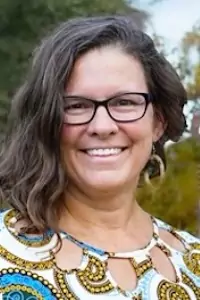 |
Amy Mcintosh Boulder - CO - United States Amy began studying African music in 1994 with master instructors both from Zimbabwe and the United States. Amy is adept at many African instruments, but especially loves marimba and hosho, and plays both with style and grace. Amy’s focus in teaching is group marimba classes for children, teens, and adults at introductory – intermediate levels. She also teaches private lessons in mbira, hosho, and singing, and incorporates these themes, along with Shona culture and language, into her group marimba classes. Amy reminds us that music is not only about notes and rhythms, but about relationships among people working together toward a common goal. |
Session 1 (Fri. 9:30 a.m.) Beginner Marimba - Boris The Bassman - "Boris the Bassman" is a great song for beginning students. The song is in A minor which gives it a spooky, mysterious feeling. We'll learn the two parts that Noah Tauscher taught Amy McIntosh when he was six years old, and add additional parts that have been developed at Kutandara over the years. Noah Tauscher learned this song in his elementary school music classroom on Orff instruments in Sequim, Washington.Session 2 (Fri. 1:00 p.m.) Intermediate Marimba - Wandibaya Moyo Pt 1 - “Wandibaya Moyo” (You Have Pierced My Heart) is an original song co-written by Randy McIntosh and Chris Berry. Over the years Randy has updated and developed the parts into a full four-section song. We'll start with basic parts for sections 1 and 2, and finish with the unison break. Once we've mastered that, we'll move on to sections 3 and 4. In this workshop it will be best to choose one part, rather than to try to learn them all. Sign up with your band! Be sure to register for BOTH parts of this two-session workshop.Session 5 (Sat. 1:00 p.m.) Beginner Marimba - Balafon - “Balafon,” an original song composed by Walt Hampton and featured in his book Hot Marimba!, is a great song for beginners of all ages. We'll start with Walt's original three parts and add additional parts as time allows. Walt Hampton has granted his permission for this workshop.Session 6 (Sat. 3:30 p.m.) Intermediate Marimba - Wandibaya Moyo Pt 2 - “Wandibaya Moyo” (You Have Pierced My Heart) is an original song co-written by Randy McIntosh and Chris Berry. Over the years Randy has updated and developed the parts into a full four-section song. We'll start with basic parts for sections 1 and 2, and finish with the unison break. Once we've mastered that, we'll move on to sections 3 and 4. In this workshop it will be best to choose one part, rather than to try to learn them all. Sign up with your band! Be sure to register for BOTH parts of this two-session workshop. |
Session 1 (Fri. 9:30 a.m.) Beginner Marimba - Boris The Bassman - "Boris the Bassman" is a great song for beginning students. The song is in A minor which gives it a spooky, mysterious feeling. We'll learn the two parts that Noah Tauscher taught Amy McIntosh when he was six years old, and add additional parts that have been developed at Kutandara over the years. Noah Tauscher learned this song in his elementary school music classroom on Orff instruments in Sequim, Washington. |
Session 2 (Fri. 1:00 p.m.) Intermediate Marimba - Wandibaya Moyo Pt 1 - “Wandibaya Moyo” (You Have Pierced My Heart) is an original song co-written by Randy McIntosh and Chris Berry. Over the years Randy has updated and developed the parts into a full four-section song. We'll start with basic parts for sections 1 and 2, and finish with the unison break. Once we've mastered that, we'll move on to sections 3 and 4. In this workshop it will be best to choose one part, rather than to try to learn them all. Sign up with your band! Be sure to register for BOTH parts of this two-session workshop. |
Session 5 (Sat. 1:00 p.m.) Beginner Marimba - Balafon - “Balafon,” an original song composed by Walt Hampton and featured in his book Hot Marimba!, is a great song for beginners of all ages. We'll start with Walt's original three parts and add additional parts as time allows. Walt Hampton has granted his permission for this workshop. |
Session 6 (Sat. 3:30 p.m.) Intermediate Marimba - Wandibaya Moyo Pt 2 - “Wandibaya Moyo” (You Have Pierced My Heart) is an original song co-written by Randy McIntosh and Chris Berry. Over the years Randy has updated and developed the parts into a full four-section song. We'll start with basic parts for sections 1 and 2, and finish with the unison break. Once we've mastered that, we'll move on to sections 3 and 4. In this workshop it will be best to choose one part, rather than to try to learn them all. Sign up with your band! Be sure to register for BOTH parts of this two-session workshop. |
||||||||
| 13 | Anesu Ndoro | 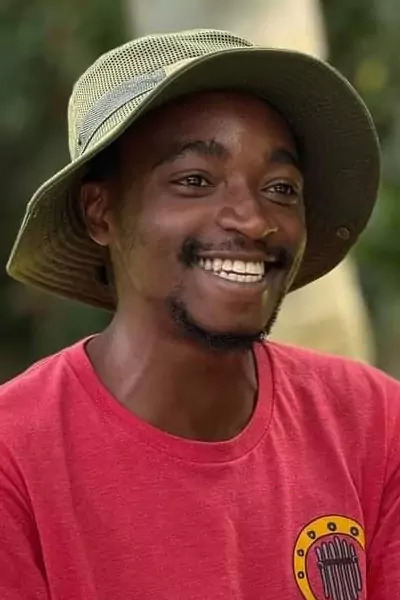 |
Anesu Ndoro Chegutu - Mashonaland West - Zimbabwe Anesu Ndoro is a Zimbabwean multi-instrumentalist, African instrument builder, and cultural educator. Having been trained in undergraduate Anthropology, he is the current Traditional African Music & Dances instructor, as well as Humanities teacher, at the USAP Community School, an institution in Zimbabwe that provides quality education to high-achieving, low-income students. He serves on the Board of Trustees for Tariro Trust Zimbabwe, an organization dedicated to empowering young women through education. In addition to his educational roles, Anesu has launched “Rayiro Culture Hub”, a social media space that showcases his experiments with creative (re)arrangements of traditional music compositions, cross-cultural conversations between different African instruments, and revival of archival Zimbabwean music(s). He is a writer who actively promotes indigenous Zimbabwean oral traditions such as folktales, proverbs, and poetry. Through sharing performances and narratives about traditional Zimbabwean instruments on his social media platforms, Anesu hopes to promote Zimbabwe's rich cultural traditions to the next generation of young Zimbabweans. For a closer look at Anesu’s work, please check out his website at https://rayiroculturehub.com/ |
Session 1 (Fri. 9:30 a.m.) All Presentation - Ngano Folktales: Storytelling - We will learn the significance of ngano folktales in Zimbabwean (specifically Karanga) cultures. Through a brief presentation and demonstrations in the first half hour, I will show students how to tell a typical set of ngano, showcasing different kinds of folktales. In the next hour, we will collectively create our own folktales (based on prompts I'll give during the workshop).The workshop will conclude with us sharing our stories as in the olden days. Ngano folktales often include a musical component, so any student who wishes to include mbira, marimba, drumming or hosho in their story creation, feel free to bring it!Session 3 (Fri. 3:30 p.m.) All Mbira - Mbira DzavaNdau - In this workshop, I'll collaborate with Sekuru Solomon Madhinga (based in Zimbabwe) to help introduce mbira dzavaNdau to a wider audience. Sekuru Madhinga is an impressive custodian of the cultural knowledge of the Ndau people, and an excellent maker and player of this instrument which is seeing a resurgence after decades of decline. This will be an introduction to the instrument, by learning two songs “Chifembera” and “Zinyakadende.” Students can choose to learn one or both songs, depending on their skill level. All sales of mbira dzavaNdau instruments and proceeds from the workshop are passed on to Sekuru Madhinga.Session 4 (Sat. 9:30 a.m.) All Other Instrument - Pan-African Orchestra - In this workshop, I will work with the participants in making a combined performance of my pan-African orchestra arrangement of Ambuya Beauler Dyoko's song "Unozofa." Ambuya Beauler, a master of the traditional repertoire of the nhare mbira, also went beyond the canon to compose her own songs. This workshop will feature a discussion break on the liberations and limitations brought forth by innovations in traditional music. We will combine mbira, marimba, drumming and voice, as well as other African percussion to bring this song to life in a pan-African orchestra. All are welcome to participate!Session 5 (Sat. 1:00 p.m.) All Presentation - Zimbabwean Proverbs - Knowing proverbs in Zimbabwe is a sign of literacy and wisdom. We will look at how these proverbs, which often draw profound insights from observing the mundane, teach an important lesson about presence and mindfulness in day-to-day living. We will do a creative activity in the second half of this workshop whereby we shall make our own proverbs by drawing on observations of our environment. This practice will train us to elevate our thinking into the metaphysical potential of the mundane, or simply put, seeing truths beyond the reality in front of us.Session 6 (Sat. 3:30 p.m.) All Other Instrument - Chizambe Bow Basics - In this collaborative workshop, I'll introduce the chizambe/xizambe/chinyamazambe, a Southern African friction bow played by the Karanga, Ndau and Shangani peoples. Workshop attendees will learn the subtle rhythmic and melodic art behind this instrument. We will learn about the historical and cultural background of friction bows, the different musical styles used within different cultural iterations of the chizambe, and we learn a song called “Ndozofa Musango.” All sales of the chizambe instruments, as well as proceeds from the workshop, will be passed on to Sekuru Madhinga who made them, to encourage him to continue promoting this diminishing craft. |
Session 1 (Fri. 9:30 a.m.) All Presentation - Ngano Folktales: Storytelling - We will learn the significance of ngano folktales in Zimbabwean (specifically Karanga) cultures. Through a brief presentation and demonstrations in the first half hour, I will show students how to tell a typical set of ngano, showcasing different kinds of folktales. In the next hour, we will collectively create our own folktales (based on prompts I'll give during the workshop).The workshop will conclude with us sharing our stories as in the olden days. Ngano folktales often include a musical component, so any student who wishes to include mbira, marimba, drumming or hosho in their story creation, feel free to bring it! |
Session 3 (Fri. 3:30 p.m.) All Mbira - Mbira DzavaNdau - In this workshop, I'll collaborate with Sekuru Solomon Madhinga (based in Zimbabwe) to help introduce mbira dzavaNdau to a wider audience. Sekuru Madhinga is an impressive custodian of the cultural knowledge of the Ndau people, and an excellent maker and player of this instrument which is seeing a resurgence after decades of decline. This will be an introduction to the instrument, by learning two songs “Chifembera” and “Zinyakadende.” Students can choose to learn one or both songs, depending on their skill level. All sales of mbira dzavaNdau instruments and proceeds from the workshop are passed on to Sekuru Madhinga. |
Session 4 (Sat. 9:30 a.m.) All Other Instrument - Pan-African Orchestra - In this workshop, I will work with the participants in making a combined performance of my pan-African orchestra arrangement of Ambuya Beauler Dyoko's song "Unozofa." Ambuya Beauler, a master of the traditional repertoire of the nhare mbira, also went beyond the canon to compose her own songs. This workshop will feature a discussion break on the liberations and limitations brought forth by innovations in traditional music. We will combine mbira, marimba, drumming and voice, as well as other African percussion to bring this song to life in a pan-African orchestra. All are welcome to participate! |
Session 5 (Sat. 1:00 p.m.) All Presentation - Zimbabwean Proverbs - Knowing proverbs in Zimbabwe is a sign of literacy and wisdom. We will look at how these proverbs, which often draw profound insights from observing the mundane, teach an important lesson about presence and mindfulness in day-to-day living. We will do a creative activity in the second half of this workshop whereby we shall make our own proverbs by drawing on observations of our environment. This practice will train us to elevate our thinking into the metaphysical potential of the mundane, or simply put, seeing truths beyond the reality in front of us. |
Session 6 (Sat. 3:30 p.m.) All Other Instrument - Chizambe Bow Basics - In this collaborative workshop, I'll introduce the chizambe/xizambe/chinyamazambe, a Southern African friction bow played by the Karanga, Ndau and Shangani peoples. Workshop attendees will learn the subtle rhythmic and melodic art behind this instrument. We will learn about the historical and cultural background of friction bows, the different musical styles used within different cultural iterations of the chizambe, and we learn a song called “Ndozofa Musango.” All sales of the chizambe instruments, as well as proceeds from the workshop, will be passed on to Sekuru Madhinga who made them, to encourage him to continue promoting this diminishing craft. |
|||||||
| 9 | Bezil Makombe | 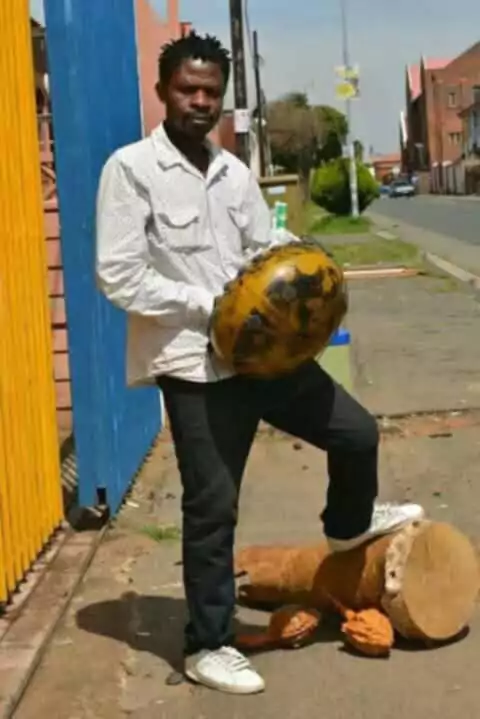 |
Bezil Makombe Vosloorus - Gauteng - South Africa Bezil Makombe has had an extraordinary mbira journey, deeply rooted in Zimbabwe’s rich musical heritage. Beginning in 1990, he played mbira for the legendary Thomas Mapfumo and the Blacks Unlimited, one of Zimbabwe’s most iconic bands known for pioneering Chimurenga music. This role placed him at the forefront of global mbira music, showcasing its spiritual and cultural resonance to audiences worldwide. Currently, Bezil directs the Gitca Mbira group, where he continues to promote and innovate within the mbira tradition. His work blends deep respect for ancestral sounds with a vision for global musical dialogue, making him a torchbearer for Zimbabwean culture. He continues to teach mbira individuals and at schools. |
Session 2 (Fri. 1:00 p.m.) Beginner Mbira - Pfumvu Paruzevha - “Pfumvu Paruzevha” is a beginner’s song that has just two phrases. It is a great song for learning how to play mbira, as well as learning how to sing or tell stories with mbira background. The lyrics sung by Thomas Mapfumo speak to problems in the rural areas during the last days of colonialism, but others such as Matemai recorded the song as “Teurai Kuvadzimu.” I will teach the kushaura part, and time permitting, the kutsinhira as well.Session 3 (Fri. 3:30 p.m.) Intermediate Mbira - Hwahwa/Karimugomba - “Hwahwa” is a playful song that speaks of a drunk man disrespecting his in-laws, cautioning everyone to drink in moderation. The mbira part is the song “Karimugomba,” a traditional staple that is part of the Taireva family of songs. I will teach the kushaura part that I played on several Thomas Mapfumo albums such as Chamunorwa and Live at El Rey.Session 5 (Sat. 1:00 p.m.) Intermediate Mbira - Hwahwa/Karimugomba2 - “Hwahwa” is a playful song that speaks of a drunk man disrespecting his in-laws, cautioning everyone to drink in moderation. The mbira part is the song “Karimugomba,” a traditional staple that is part of the Taireva family of songs. I will teach the kushaura part that I played on several Thomas Mapfumo albums such as Chamunorwa and Live at El Rey.Session 6 (Sat. 3:30 p.m.) Novice Mbira - Chemutengure - “Chemutengure” is a playful song that commemorates traveling on ox-drawn wagons in the colonial era, with lyrics that speak to lubrication of the wheels and the driver and his wife using lubricating grease as cooking butter and body lotion. It is an easy two-phrase song played on the nyunga nyunga, marimba, mbira or modern instruments, and can even be sung without instruments. I will teach the kushaura part on the mbira (and time permitting, the kutsinhira as well) that I played on the famous Thomas Mapfumo recording Live at El Rey.Session 7 (Sun. 1:00 p.m.) Intermediate Mbira - Mahororo - "Mahororo" means the low or bass notes on the mbira, and the song is so named because it is heavy on those notes. It is a staple song on the mbira and after “Karigamombe” is the next song in learning the Nyamaropa family of songs. I will teach the kushaura part that I played on Thomas Mapfumo’s recording “Hanzvadzi” on the album Vanhu Vatema and it is closely related to “Mukadzi weMukoma” that I played on Mapfumo’s Roots Chimurenga album. |
Session 2 (Fri. 1:00 p.m.) Beginner Mbira - Pfumvu Paruzevha - “Pfumvu Paruzevha” is a beginner’s song that has just two phrases. It is a great song for learning how to play mbira, as well as learning how to sing or tell stories with mbira background. The lyrics sung by Thomas Mapfumo speak to problems in the rural areas during the last days of colonialism, but others such as Matemai recorded the song as “Teurai Kuvadzimu.” I will teach the kushaura part, and time permitting, the kutsinhira as well. |
Session 3 (Fri. 3:30 p.m.) Intermediate Mbira - Hwahwa/Karimugomba - “Hwahwa” is a playful song that speaks of a drunk man disrespecting his in-laws, cautioning everyone to drink in moderation. The mbira part is the song “Karimugomba,” a traditional staple that is part of the Taireva family of songs. I will teach the kushaura part that I played on several Thomas Mapfumo albums such as Chamunorwa and Live at El Rey. |
Session 5 (Sat. 1:00 p.m.) Intermediate Mbira - Hwahwa/Karimugomba2 - “Hwahwa” is a playful song that speaks of a drunk man disrespecting his in-laws, cautioning everyone to drink in moderation. The mbira part is the song “Karimugomba,” a traditional staple that is part of the Taireva family of songs. I will teach the kushaura part that I played on several Thomas Mapfumo albums such as Chamunorwa and Live at El Rey. |
Session 6 (Sat. 3:30 p.m.) Novice Mbira - Chemutengure - “Chemutengure” is a playful song that commemorates traveling on ox-drawn wagons in the colonial era, with lyrics that speak to lubrication of the wheels and the driver and his wife using lubricating grease as cooking butter and body lotion. It is an easy two-phrase song played on the nyunga nyunga, marimba, mbira or modern instruments, and can even be sung without instruments. I will teach the kushaura part on the mbira (and time permitting, the kutsinhira as well) that I played on the famous Thomas Mapfumo recording Live at El Rey. |
Session 7 (Sun. 1:00 p.m.) Intermediate Mbira - Mahororo - "Mahororo" means the low or bass notes on the mbira, and the song is so named because it is heavy on those notes. It is a staple song on the mbira and after “Karigamombe” is the next song in learning the Nyamaropa family of songs. I will teach the kushaura part that I played on Thomas Mapfumo’s recording “Hanzvadzi” on the album Vanhu Vatema and it is closely related to “Mukadzi weMukoma” that I played on Mapfumo’s Roots Chimurenga album. |
|||||||
| 37 | Blessing Chimanga | 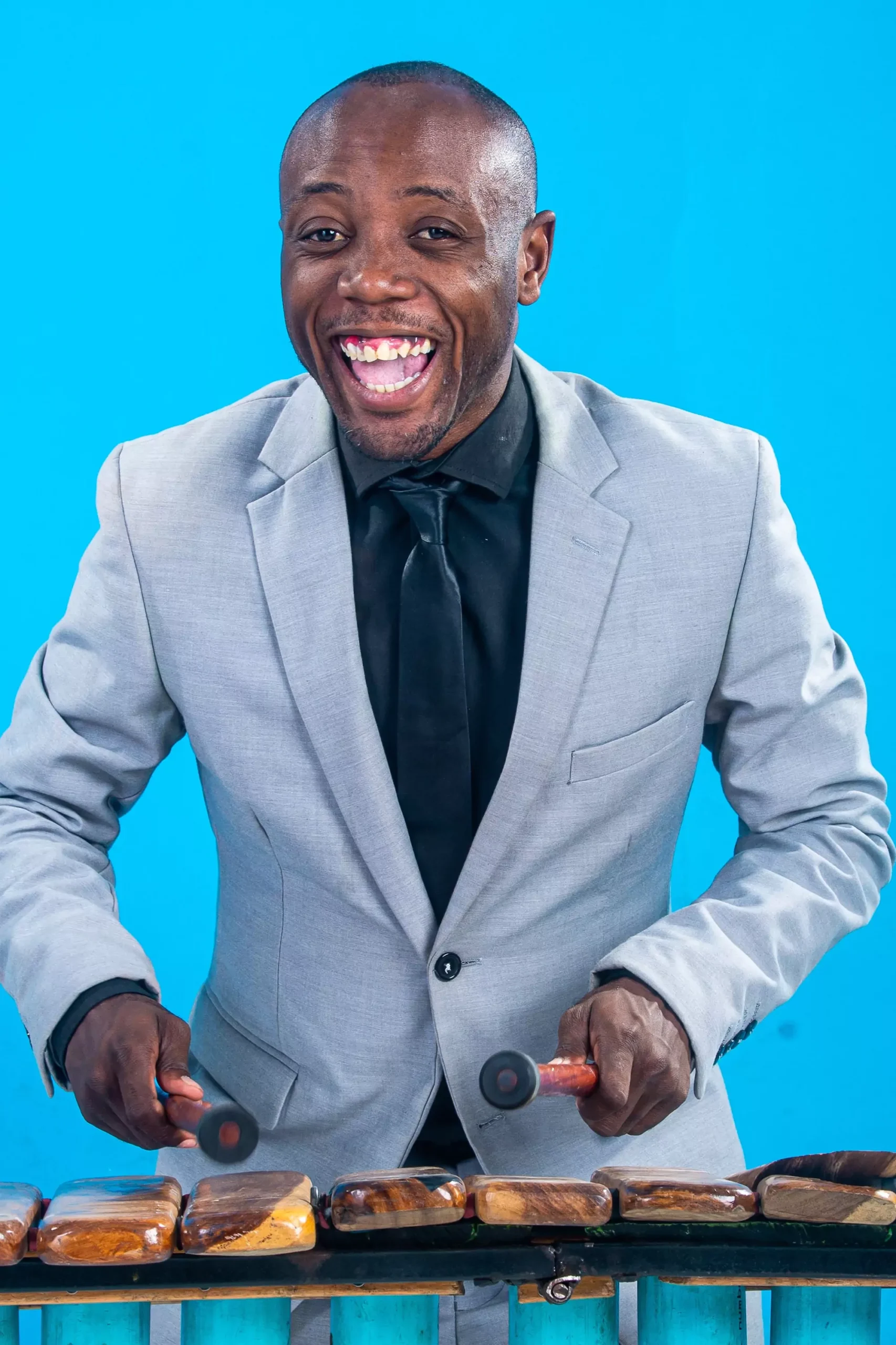 |
Blessing Chimanga Lafayette - Colorado - Zimbabwe Blessing “Bled” Chimanga is an internationally acclaimed Zimbabwean musician, singer, and songwriter, celebrated for his electrifying stage presence and remarkable talent as a multi-instrumentalist. A virtuoso on the marimba, drums, and vocals, Blessing seamlessly blends Afro-jazz, traditional Zimbabwean sounds, and contemporary rhythms to create music that resonates globally. As a dynamic bandleader, music director and marimba coach. His performances are vibrant, interactive, and deeply soulful, captivating audiences with his infectious energy and passion.Blessing has toured extensively, gracing stages at major festivals across Africa, Europe, Asia, and America, earning recognition as a true cultural ambassador. His ability to connect with audiences transcends language and borders, making him a perfect fit for festivals seeking an artist who can inspire joy, unity, and celebration. A storyteller and crowd-pleaser, BlessingChimanga is more than a musician—he is an unforgettable experience. Blessing is the director and founder of Dreams Marimba Camp and 50 voices of Marimba annual camps that are hosted in Zimbabwe and USA Blessing has composed 20+ marimba songs and these songs are on his 2 marimba albums. |
Session 1 (Fri. 9:30 a.m.) Intermediate Marimba - Mhondoro - "Mhondoro" is a popular mhande song played on both marimba and mbira. This version is rearranged by Blessing Chimanga and yet keeps the true authentic sound of the traditional song.Session 4 (Sat. 9:30 a.m.) Intermediate Marimba - Taitandara - Experience the joy and energy of “Taitandara,” one of Blessing Chimanga’s most popular marimba compositions. The song is currently being played by many groups because of how challenging and yet fun it is to play and to share with audiences. The song comes out of Blessing's Kuimba Nemarimba album. Taitandara means “we were hanging out, having a good time together” and that’s exactly what this workshop is all about! Come ready to play, dance and push your marimba skills to the next level!Session 6 (Sat. 3:30 p.m.) Intermediate Marimba - Marimba Band Clinic - This workshop is designed for bands looking to elevate their performance through expert guidance in song arrangement, choreography and stage presence. Each participating band will bring a song of their choice to perform for Coach Blessing Chimanga. With his musical expertise, he will rearrange the song on the spot, enhancing the intro and ending, adding variations, creative twists and some movement and energy to enhance the performance. The band will leave with a revamped and dynamic arrangement ready to impress any audience. Refine your sound and stagecraft with one of the best coaches in the industry! In order to sign your band up for this workshop, write to teachers@zimfest.org for a code each band member must put in their registration. First come first served! Blessing may be able to teach more than one session. |
Session 1 (Fri. 9:30 a.m.) Intermediate Marimba - Mhondoro - "Mhondoro" is a popular mhande song played on both marimba and mbira. This version is rearranged by Blessing Chimanga and yet keeps the true authentic sound of the traditional song. |
Session 4 (Sat. 9:30 a.m.) Intermediate Marimba - Taitandara - Experience the joy and energy of “Taitandara,” one of Blessing Chimanga’s most popular marimba compositions. The song is currently being played by many groups because of how challenging and yet fun it is to play and to share with audiences. The song comes out of Blessing's Kuimba Nemarimba album. Taitandara means “we were hanging out, having a good time together” and that’s exactly what this workshop is all about! Come ready to play, dance and push your marimba skills to the next level! |
Session 6 (Sat. 3:30 p.m.) Intermediate Marimba - Marimba Band Clinic - This workshop is designed for bands looking to elevate their performance through expert guidance in song arrangement, choreography and stage presence. Each participating band will bring a song of their choice to perform for Coach Blessing Chimanga. With his musical expertise, he will rearrange the song on the spot, enhancing the intro and ending, adding variations, creative twists and some movement and energy to enhance the performance. The band will leave with a revamped and dynamic arrangement ready to impress any audience. Refine your sound and stagecraft with one of the best coaches in the industry! In order to sign your band up for this workshop, write to teachers@zimfest.org for a code each band member must put in their registration. First come first served! Blessing may be able to teach more than one session. |
|||||||||
| 30 | Caden Davis | 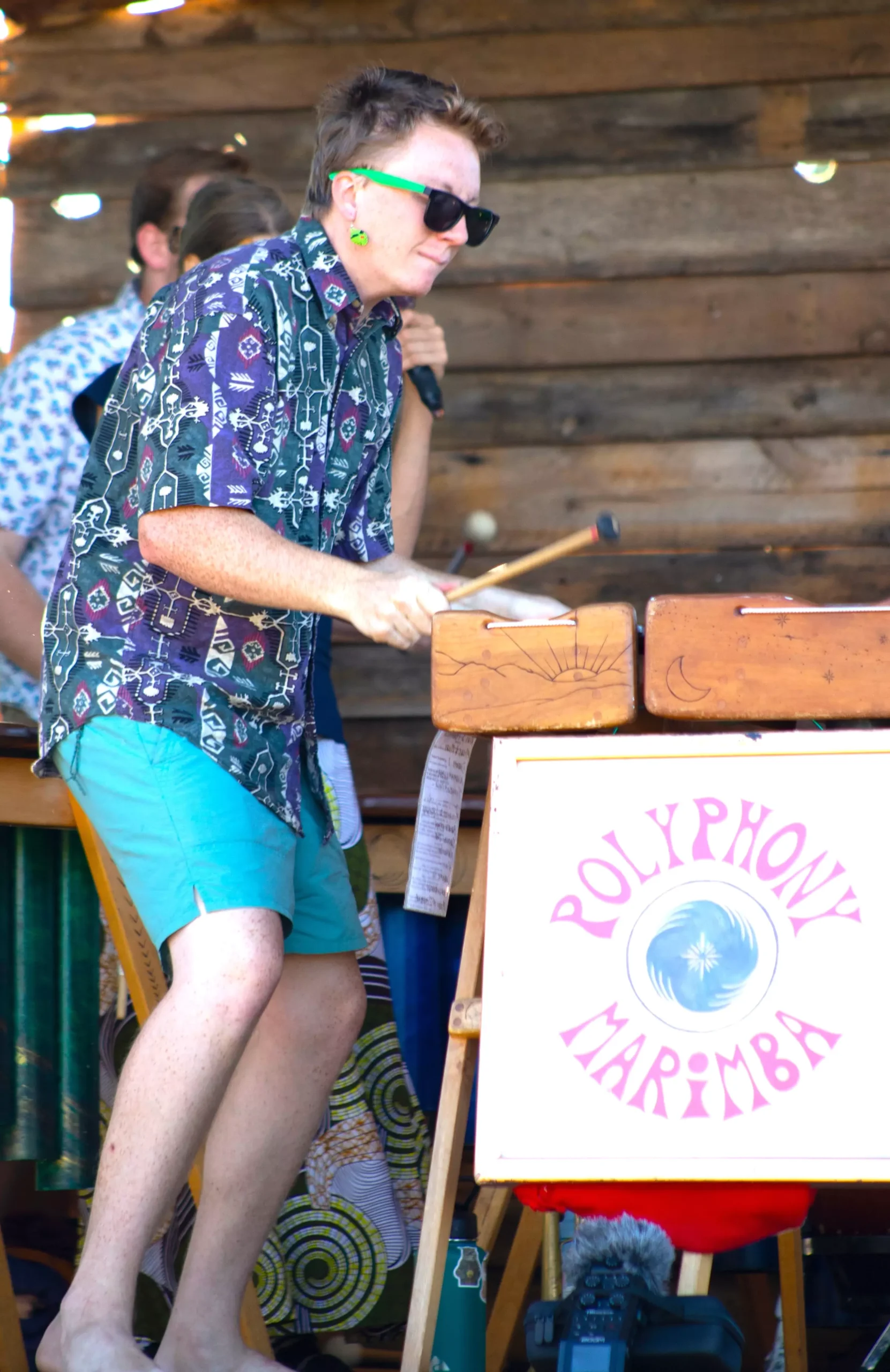 |
Caden Davis Bellingham - WA - United States Caden Davis, 25, has had his life entirely taken over by his obsession with Zimbabwean music. Caden is a founding member of Pamwe Marimba, serving as a primary arranger/composer for the group, and is also a former member of Polyphony Marimba (2021-2023). Aside from being a marimba teacher and performer, he also loves playing mbira, trumpet and guitar, as well as conducting. Caden is a passionate educator, and has taught marimba in Washington, Idaho, California, Missouri, Illinois, and Vancouver Island, B.C. He earned his undergraduate degree in Trumpet Performance from the University of Idaho in 2021, and is now working on his Masters in Music Education at Western Washington University, where his research primarily revolves around advocating for the use of Kwanongoma marimba ensemble in secondary education music curriculum. He is an active teacher at the Rubatano Center in Langley, WA, under the direction of Dana Moffett. In January 2025, Caden opened his own community marimba studio, the Bellingham Community Marimba Project. |
Session 3 (Fri. 3:30 p.m.) Intermediate Marimba - Taireva on Marimba - "Taireva," a staple of the mbira repertoire means "we told you" or “we used to warn you.” Caden will teach an arrangement for seven marimbas.Session 4 (Sat. 9:30 a.m.) Advanced Marimba - Zvichapera - In this workshop, we will be learning my arrangement of “Zvichapera” which is modeled after Chiwoniso's beautiful recording. We will look at how the marimba parts were extracted straight from the mbira parts to make an mbira-esque sounding marimba arrangement. |
Session 3 (Fri. 3:30 p.m.) Intermediate Marimba - Taireva on Marimba - "Taireva," a staple of the mbira repertoire means "we told you" or “we used to warn you.” Caden will teach an arrangement for seven marimbas. |
Session 4 (Sat. 9:30 a.m.) Advanced Marimba - Zvichapera - In this workshop, we will be learning my arrangement of “Zvichapera” which is modeled after Chiwoniso's beautiful recording. We will look at how the marimba parts were extracted straight from the mbira parts to make an mbira-esque sounding marimba arrangement. |
||||||||||
| 40 | Caleb Donahue |  |
Caleb Donahue Eugene - OR - United States I was first introduced to the marimba when I was 10 years old, and I simply couldn't get enough of it. In my time as a student of Kutsinhira Cultural Arts Center, I learned a wide variety of songs taught be many teachers. I myself became a teacher in 2017 and have taught students of all skill levels. I love so deeply to teach people about the joyfulness of this incredible music and help the local community grow. I currently perform with a few different bands, and my favorite experience is watching an audience enjoy the music as much as I do. |
Session 7 (Sun. 1:00 p.m.) Novice Marimba - Kamba - "Kamba" is the Shona word for tortoise. The song was written by Mandy Walker-LaFollette and Wanda Walker, and it's a cheerful song with some fun and bouncy parts. The song features some cool intro lines and duet sections. The difficulty level of this song is appropriate for novice or intermediate players.Session 8 (Sun. 3:30 p.m.) Novice Marimba - Chemwainyera - Chemwainyera is a contemporary song composed by Dumisani Maraire. It is very commonly taught to beginner groups at Kutsinhira Cultural Arts Center. The meaning of the song is "What you have been waiting for is now happening." It is a lively song that is very fun to dance to. Players looking to learn the lead should be ready for somewhat complex running lines. |
Session 7 (Sun. 1:00 p.m.) Novice Marimba - Kamba - "Kamba" is the Shona word for tortoise. The song was written by Mandy Walker-LaFollette and Wanda Walker, and it's a cheerful song with some fun and bouncy parts. The song features some cool intro lines and duet sections. The difficulty level of this song is appropriate for novice or intermediate players. |
Session 8 (Sun. 3:30 p.m.) Novice Marimba - Chemwainyera - Chemwainyera is a contemporary song composed by Dumisani Maraire. It is very commonly taught to beginner groups at Kutsinhira Cultural Arts Center. The meaning of the song is "What you have been waiting for is now happening." It is a lively song that is very fun to dance to. Players looking to learn the lead should be ready for somewhat complex running lines. |
||||||||||
| 33 | Daniel Lockley | 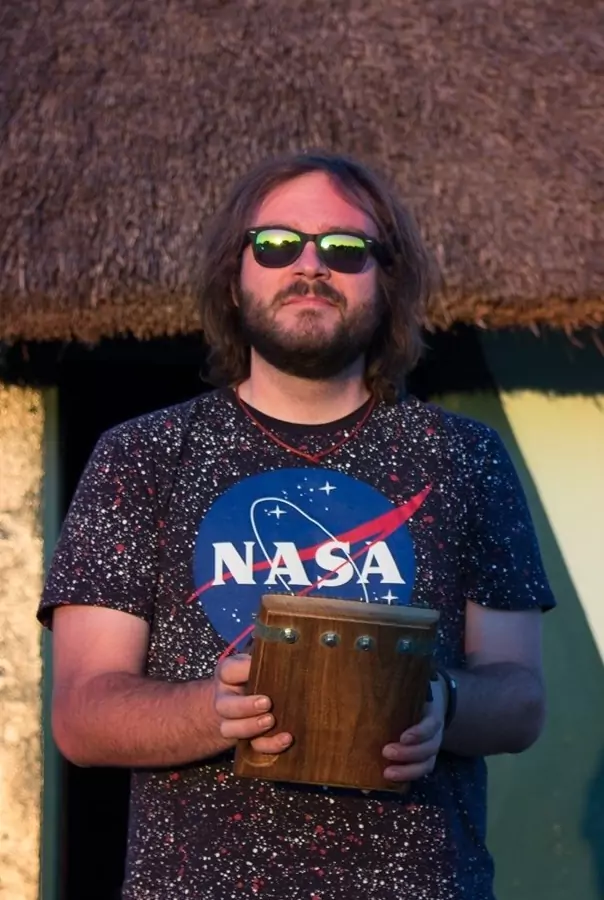 |
Daniel Lockley Santa Fe - NM - United States Daniel Lockley was born in Santa Fe, NM, where he began learning marimba and mbira in 1997. What started as a casual after-school hobby ultimately became a life-long pursuit and career. Daniel has performed with numerous bands, including The Andé Marimba Band, Boka Marimba, Jaka, Zimbira, and many more. Daniel has taught at the Ethos Music Center in Portland, OR, The Kutandara Center/Moon and Stars Foundation in Boulder, CO, numerous schools ranging from elementary to graduate, and workshops and camps across the country. |
Session 3 (Fri. 3:30 p.m.) Advanced Mbira - Alois Mutinhiri's Mahororo - According to Alois, “Mahororo” is a song about a special place where people used to go to brew beer for the rainy season. This version, while unique, still fits beautifully with other versions, particularly from teachers associated with the Mhondoro region, such as the Magaya family.Session 6 (Sat. 3:30 p.m.) Intermediate Mbira - Alois Mutinhiri’s Chipembere - According to Alois, “Chipembere” (Rhinoceros) is a song played by hunters before facing dangerous animals.Session 7 (Sun. 1:00 p.m.) Intermediate Marimba - Chigwaya - "Chigwaya" is a song from the mbira repertoire that is usually played for the njuzu, or water spirits. The song is noteworthy for it's unusual six-beat cycle, giving it a unique flavor.Session 8 (Sun. 3:30 p.m.) Advanced Mbira - Alois Mutinhiri's Dande - Dande is a place in Zimbabwe where people go to look for salt. It is also a place with many powerful spirits. This version of "Dande" is a unique interpretation of the song but still fits beautifully with other parts you may have learned. |
Session 3 (Fri. 3:30 p.m.) Advanced Mbira - Alois Mutinhiri's Mahororo - According to Alois, “Mahororo” is a song about a special place where people used to go to brew beer for the rainy season. This version, while unique, still fits beautifully with other versions, particularly from teachers associated with the Mhondoro region, such as the Magaya family. |
Session 6 (Sat. 3:30 p.m.) Intermediate Mbira - Alois Mutinhiri’s Chipembere - According to Alois, “Chipembere” (Rhinoceros) is a song played by hunters before facing dangerous animals. |
Session 7 (Sun. 1:00 p.m.) Intermediate Marimba - Chigwaya - "Chigwaya" is a song from the mbira repertoire that is usually played for the njuzu, or water spirits. The song is noteworthy for it's unusual six-beat cycle, giving it a unique flavor. |
Session 8 (Sun. 3:30 p.m.) Advanced Mbira - Alois Mutinhiri's Dande - Dande is a place in Zimbabwe where people go to look for salt. It is also a place with many powerful spirits. This version of "Dande" is a unique interpretation of the song but still fits beautifully with other parts you may have learned. |
||||||||
| 42 | Helen Masvikeni - Masango | 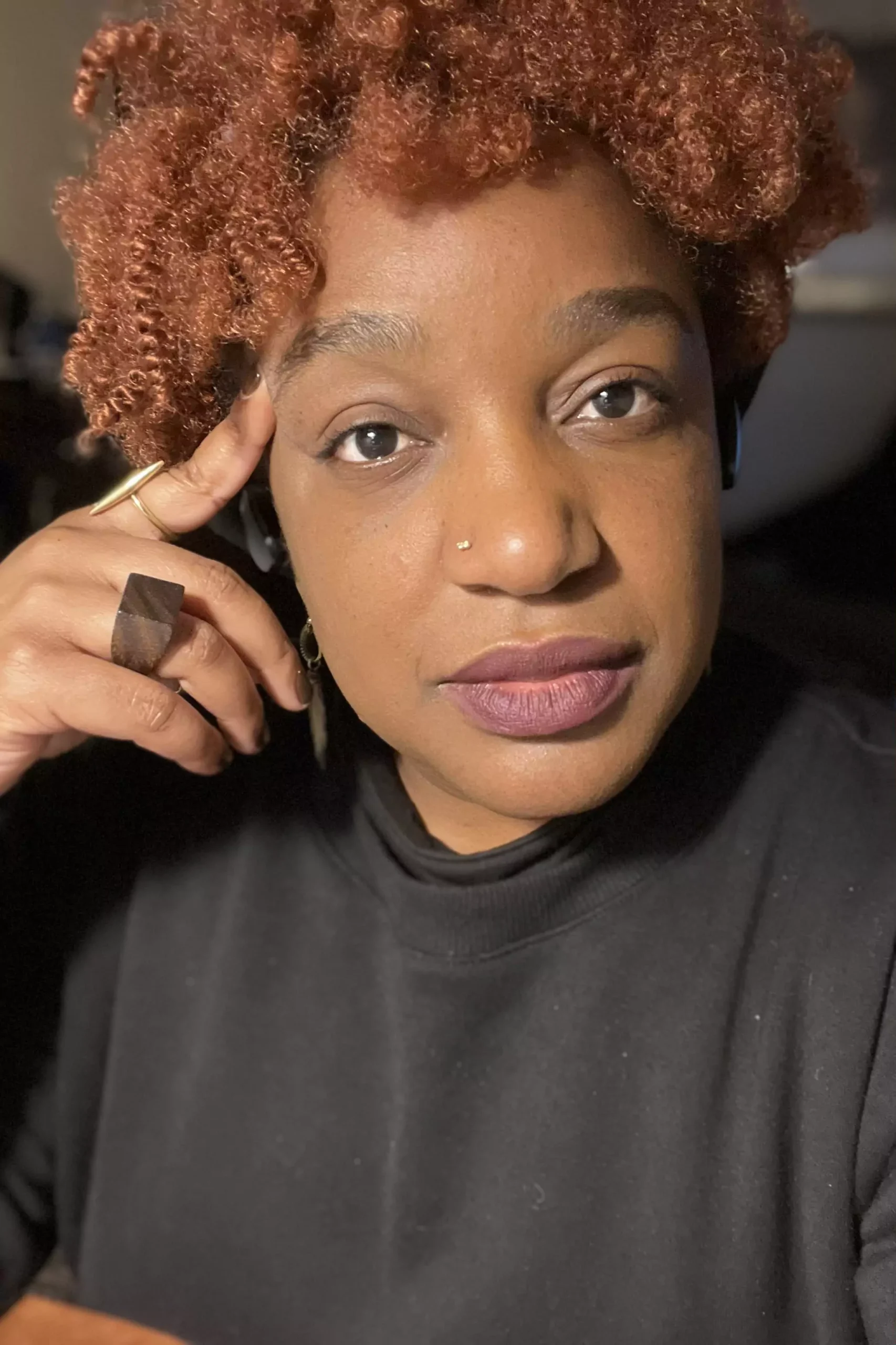 |
Helen Masvikeni - Masango Westminster - CO - United States Helen Masvikeni-Masango is a multidisciplinary Zimbabwean artist whose work spans photography, music, dance, and cultural storytelling. With a passion for preserving and sharing Zimbabwean traditions, Helen uses artistic expression to create spaces for connection and dialogue. Internationally renowned for her photography, she captures stories of identity and belonging through powerful visual narratives. As a musician and dancer, she blends soulful melodies with the vibrant rhythms of Zimbabwean music, creating immersive experiences that celebrate African heritage. At Zimfest, Helen will lead African dance workshops rooted in traditional Zimbabwean movement, singing classes focusing on proper shona pronunciation and conversations exploring Zimbabwean culture—from its rich history to contemporary expressions. With warmth, insight, and infectious energy, Helen invites participants to engage with culture not only as an observer but as an active participant. Whether through movement, song, or dialogue, her workshops offer a journey into the heart of Zimbabwean artistry and a celebration of the power of collective expression. |
Session 2 (Fri. 1:00 p.m.) All Presentation - Culture In Transition - A provocative exploration of what elements of Zimbabwean culture still serve its people and what might need to be questioned, evolve or be abandoned. |
Session 2 (Fri. 1:00 p.m.) All Presentation - Culture In Transition - A provocative exploration of what elements of Zimbabwean culture still serve its people and what might need to be questioned, evolve or be abandoned. |
|||||||||||
| 39 | Jeff Brahe | 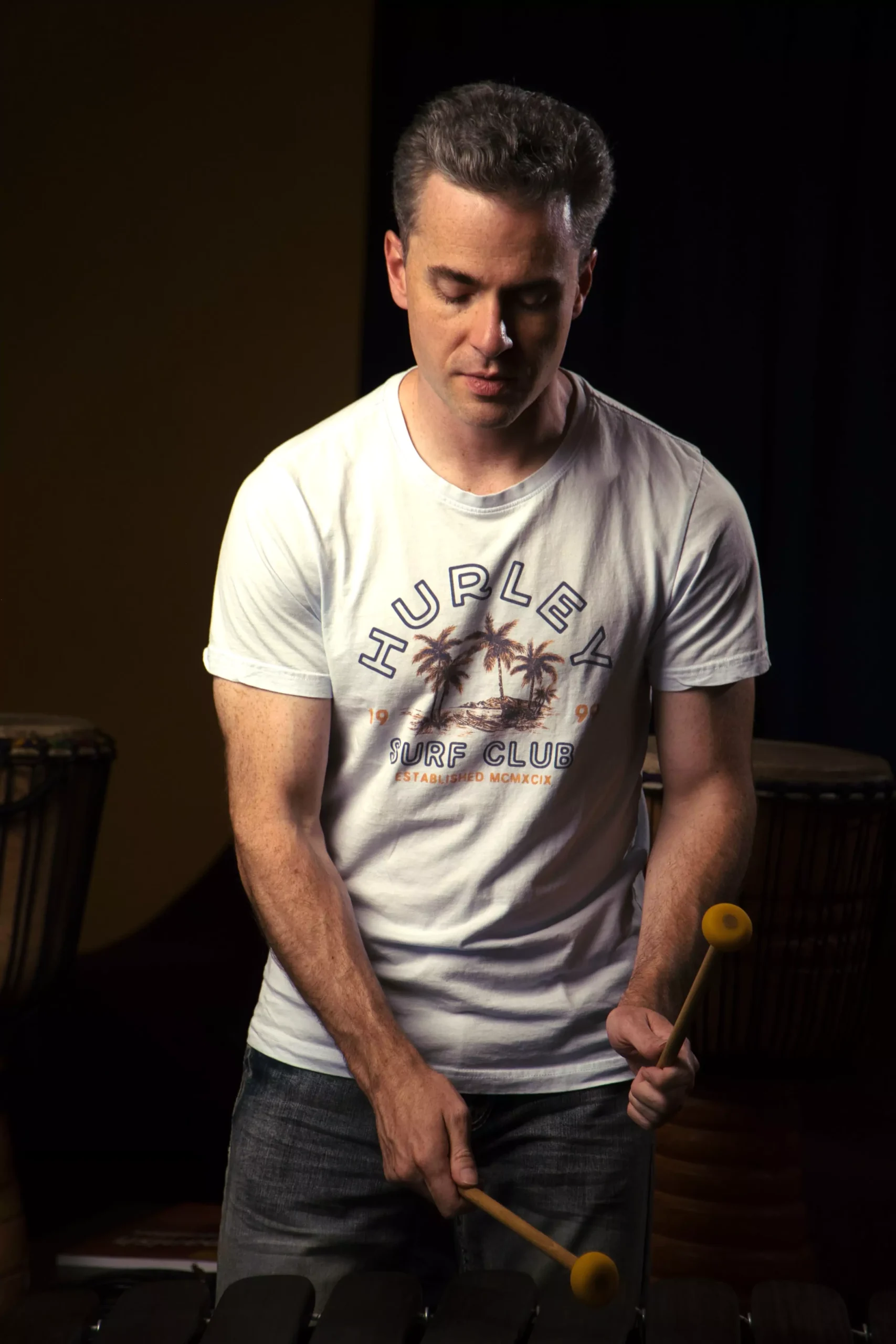 |
Jeff Brahe Tacoma - WA - United States Jeff Brahe has played Zimbabwean music since age 10. He has striven to immerse himself in as many aspects of the music as possible, including marimba, mbira (nhare, matepe, kalimba mudoko, etc.), vocals, dance, drum, hosho, and more. As a co-founder of Camp Batidza and full-time musician, Jeff maintains a relentless schedule of rehearsing, teaching, performing, composing, arranging, recording, and sometimes hosting Zimbabwean guests. He resides in Tacoma, WA. Past projects include Andé Marimba Band, Pachedu Orchestra, Anzanga Marimba Ensemble, and Jekesa Marimba. Current projects include the Jeff Brahe Band, an innovative fusion of Zimbabwean and other music styles, and Kwetu Band, a Congolese Afropop/Afrojazz band based in Seattle. |
Session 1 (Fri. 9:30 a.m.) Advanced Marimba - Ndonda - An important song in the hera/matepe repertoire, "Ndonda” has unique and beautiful melodies similar to the mbira dzavadzimu song “Dangurangu.” This arrangement features some very challenging rhythms and parts, but when it all comes together it will transport you to an otherworldly state of being!Session 6 (Sat. 3:30 p.m.) Advanced Marimba - Different Worlds - Debuted at Camp Batidza 2023, “Different Worlds” is an original song that pays strong homage to the mbira tradition and chimurenga-style Afropop, while also innovating and blending with many other influences. This version will be a purely instrumental arrangement for marimba, but the song can easily be adapted for mixed instrumentation and/or a vocal lead. Experience and express the melancholic beauty and heartbreak that comes when two cultures and worlds collide and are wrenched apart again. |
Session 1 (Fri. 9:30 a.m.) Advanced Marimba - Ndonda - An important song in the hera/matepe repertoire, "Ndonda” has unique and beautiful melodies similar to the mbira dzavadzimu song “Dangurangu.” This arrangement features some very challenging rhythms and parts, but when it all comes together it will transport you to an otherworldly state of being! |
Session 6 (Sat. 3:30 p.m.) Advanced Marimba - Different Worlds - Debuted at Camp Batidza 2023, “Different Worlds” is an original song that pays strong homage to the mbira tradition and chimurenga-style Afropop, while also innovating and blending with many other influences. This version will be a purely instrumental arrangement for marimba, but the song can easily be adapted for mixed instrumentation and/or a vocal lead. Experience and express the melancholic beauty and heartbreak that comes when two cultures and worlds collide and are wrenched apart again. |
||||||||||
| 19 | Jesse Larson | 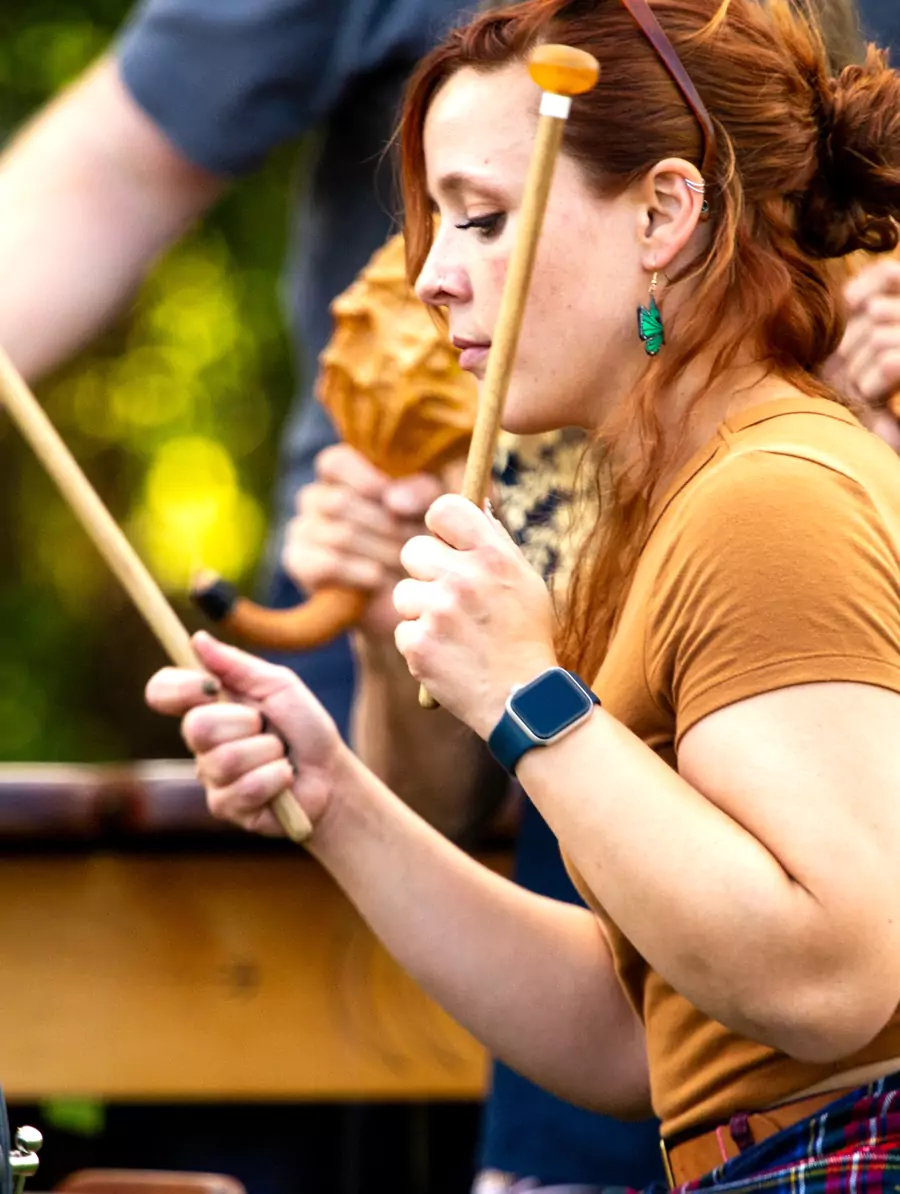 |
Jesse Larson Santa Fe - NM - United States Jesse Larson began playing marimba at the Kutandara Center in Boulder, Colorado when she was 11 years old, and 20 years later is still going strong. Jesse left Colorado after high school, but continued to follow her love of Zimbabwean music all around the world, and eventually spent 3 years in Indonesia performing with Supa Kalulu and teaching marimba at Green School in Bali. Though she is currently residing in Santa Fe, New Mexico, she still regularly travels to teach all around the US. She also spends a part of every year in Juneau, Alaska teaching classes and directing the Juneau based band, Njuzu. Jesse has also toured with Polyphony, Ande, and is one of the founders of Pamwe Marimba, which tours all around the US regularly. She is also currently a member of Santa Fe based band, Zuva. Jesse is also one of the co-founders and organizers of Camp Batidza, an advanced Zimbabwean music class for young adults. |
Session 4 (Sat. 9:30 a.m.) Beginner Marimba - Twiza - "Twiza" (Giraffe) is a great song to learn for those who are just starting out on marimba. Though it is fairly simple, it's an incredibly fun and upbeat song to play. Two of the main parts are on-beat and off-beat, so we will spend a portion of the class working on understanding those rhythms.Session 7 (Sun. 1:00 p.m.) Novice Marimba - Chiedza - "Chiedza" was written during a particularly dark and dreary Alaskan winter, in an attempt to brighten things up a bit! It features two harmonizing soprano lines as the
main melodies, and some funky bass and baritone parts holding things down in the back. This song is fun, laid back, and danceable. |
Session 4 (Sat. 9:30 a.m.) Beginner Marimba - Twiza - "Twiza" (Giraffe) is a great song to learn for those who are just starting out on marimba. Though it is fairly simple, it's an incredibly fun and upbeat song to play. Two of the main parts are on-beat and off-beat, so we will spend a portion of the class working on understanding those rhythms. |
Session 7 (Sun. 1:00 p.m.) Novice Marimba - Chiedza - "Chiedza" was written during a particularly dark and dreary Alaskan winter, in an attempt to brighten things up a bit! It features two harmonizing soprano lines as the
main melodies, and some funky bass and baritone parts holding things down in the back. This song is fun, laid back, and danceable. |
||||||||||
| 26 | Leo Brooks | 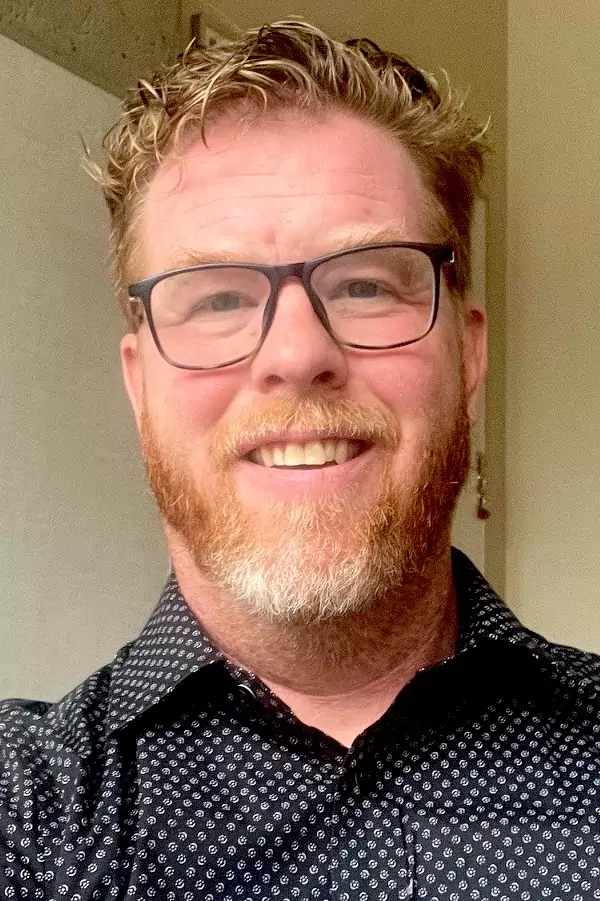 |
Leo Brooks LETHBRIDGE - Alberta - Canada Born in Calgary, Alberta, Leo earned his Bachelor of Music from the University of Lethbridge in 1996. After moving to Ottawa, Ontario, his musical path diverged to the study of the rhythmic traditions of West Africa. He soon began not only teaching African Drumming classes and workshops but building and repairing beautiful drums under the banner of his company Treefrog Percussion. In 2005 Leo embarked on a study tour of West Africa, learning from master percussionists in Guinea, Mali and Nigeria. From 2006 onward, in addition to performing with numerous groups in Ottawa, he taught extensively in schools throughout Eastern Ontario and Western Quebec. He enriched the musical education of thousands of children through his interactive classes, drum building workshops and rhythm circles. In 2019 Leo returned to Alberta to pursue his master’s degree, doing a special project in Music Education Technology. His resulting research earned him a Governor General’s Gold medal for academic excellence in 2023. Leo continues to teach and perform as the assistant director of the University of Lethbridge Global Drums ensemble. |
Session 4 (Sat. 9:30 a.m.) Beginner Drum - Drumming Basics - We will guide the group through the basics of polyrhythm, teaching traditional multipart grooves. For those who are new to hand drumming, this workshop will show you how to get great sounds out of your drum while keeping your fingers and thumbs safe. Geared for beginners but open to all levels, everyone will gain insights and have fun making music together in this workshop. |
Session 4 (Sat. 9:30 a.m.) Beginner Drum - Drumming Basics - We will guide the group through the basics of polyrhythm, teaching traditional multipart grooves. For those who are new to hand drumming, this workshop will show you how to get great sounds out of your drum while keeping your fingers and thumbs safe. Geared for beginners but open to all levels, everyone will gain insights and have fun making music together in this workshop. |
|||||||||||
| 8 | Lino Piloto | 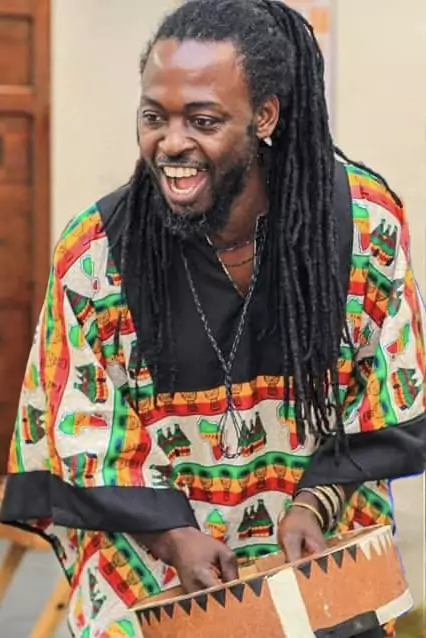 |
Lino Piloto Mutare - Manicaland - Zimbabwe Lino Piloto is an artist who specializes in Mbira and Marimba music started playing Mbira and Marimba in 2000 formed a group called Ntswai Ntswai which has grown to be an arts organization. He was a lecture of music and arts and Africa University from 2002-2007. During that time was also teaching music at Mutare School of Music and teaching marimba and dance to the deaf people at Nzeve. He grew the Ntswai Ntswai from a crew to an arts organization which is now nationally regionally and internationally recognized specializing in making Marimba Mbira Ngoma Hosho and live performances. He has taught Mbira and Marimba at Mary Mount teachers College, Mutare Teacher College, Mutare Poly Technical College, St Dominic's High School Chirowakamwe Primary School, Chitakatira High School, Rock of Ages Junior School, Alma Institute, Hillside Junior School, and also have embarked on teaching online lesson via zoom meetings what's app video calling or messenger video call. He has traveled to Mozambique, South Africa And German to teach Mbira and Marimba also having workshops. |
Session 1 (Fri. 9:30 a.m.) All Mbira - Exploring Nyunga Nyunga - This interactive workshop invites participants to explore the rich cultural heritage and mesmerizing sounds of this traditional Zimbabwean instrument. This session will introduce the basics of playing techniques of the nyunga nyunga and its role in our Zimbabwean culture. We will be exercising the development of hand-eye coordination and learning simple melodies and rhythms. We look forward to sharing the enchanting world of nyunga nyunga mbira with you!Session 2 (Fri. 1:00 p.m.) Beginner Marimba - Rhythms Of Marimba - This interactive workshop introduces participants to the rich sounds and rhythms of marimba in a modern way. making it exciting to learn and play. This hands-on workshop will cover the basics of marimba playing techniques, explore various musical styles and provide a fun and engaging experience for all participants.Session 4 (Sat. 9:30 a.m.) Beginner Mbira - Exploring Mbira DzaVadzimu - This session will introduce the basics of playing techniques of mbira dzavadzimu, the history and the meaning of mbira dzavadzimu and its role in our Zimbabwean culture. We will be exercising the development of hand-eye coordination, learning simple melodies and rhythms and experience an introduction to ensemble playing.Session 7 (Sun. 1:00 p.m.) All Hosho - Rhythms Of Hosho - This workshop introduces the participants to the basics of hosho and its role in Zimbabwean traditional music, arts and culture. We will present fundamental techniques and skills, exploring traditional and contemporary hosho music styles, discussing types of hosho playing and construction and basic holding and shaking techniques.Session 8 (Sun. 3:30 p.m.) All Mbira - Exploring Nyunga Nyunga2 - This interactive workshop invites participants to explore the rich cultural heritage and mesmerizing sounds of this traditional Zimbabwean instrument. This session will introduce the basics of playing techniques of the nyunga nyunga and its role in our Zimbabwean culture. We will be exercising the development of hand-eye coordination and learning simple melodies and rhythms. We look forward to sharing the enchanting world of nyunga nyunga mbira with you! |
Session 1 (Fri. 9:30 a.m.) All Mbira - Exploring Nyunga Nyunga - This interactive workshop invites participants to explore the rich cultural heritage and mesmerizing sounds of this traditional Zimbabwean instrument. This session will introduce the basics of playing techniques of the nyunga nyunga and its role in our Zimbabwean culture. We will be exercising the development of hand-eye coordination and learning simple melodies and rhythms. We look forward to sharing the enchanting world of nyunga nyunga mbira with you! |
Session 2 (Fri. 1:00 p.m.) Beginner Marimba - Rhythms Of Marimba - This interactive workshop introduces participants to the rich sounds and rhythms of marimba in a modern way. making it exciting to learn and play. This hands-on workshop will cover the basics of marimba playing techniques, explore various musical styles and provide a fun and engaging experience for all participants. |
Session 4 (Sat. 9:30 a.m.) Beginner Mbira - Exploring Mbira DzaVadzimu - This session will introduce the basics of playing techniques of mbira dzavadzimu, the history and the meaning of mbira dzavadzimu and its role in our Zimbabwean culture. We will be exercising the development of hand-eye coordination, learning simple melodies and rhythms and experience an introduction to ensemble playing. |
Session 7 (Sun. 1:00 p.m.) All Hosho - Rhythms Of Hosho - This workshop introduces the participants to the basics of hosho and its role in Zimbabwean traditional music, arts and culture. We will present fundamental techniques and skills, exploring traditional and contemporary hosho music styles, discussing types of hosho playing and construction and basic holding and shaking techniques. |
Session 8 (Sun. 3:30 p.m.) All Mbira - Exploring Nyunga Nyunga2 - This interactive workshop invites participants to explore the rich cultural heritage and mesmerizing sounds of this traditional Zimbabwean instrument. This session will introduce the basics of playing techniques of the nyunga nyunga and its role in our Zimbabwean culture. We will be exercising the development of hand-eye coordination and learning simple melodies and rhythms. We look forward to sharing the enchanting world of nyunga nyunga mbira with you! |
|||||||
| 32 | Lucky Moyo | 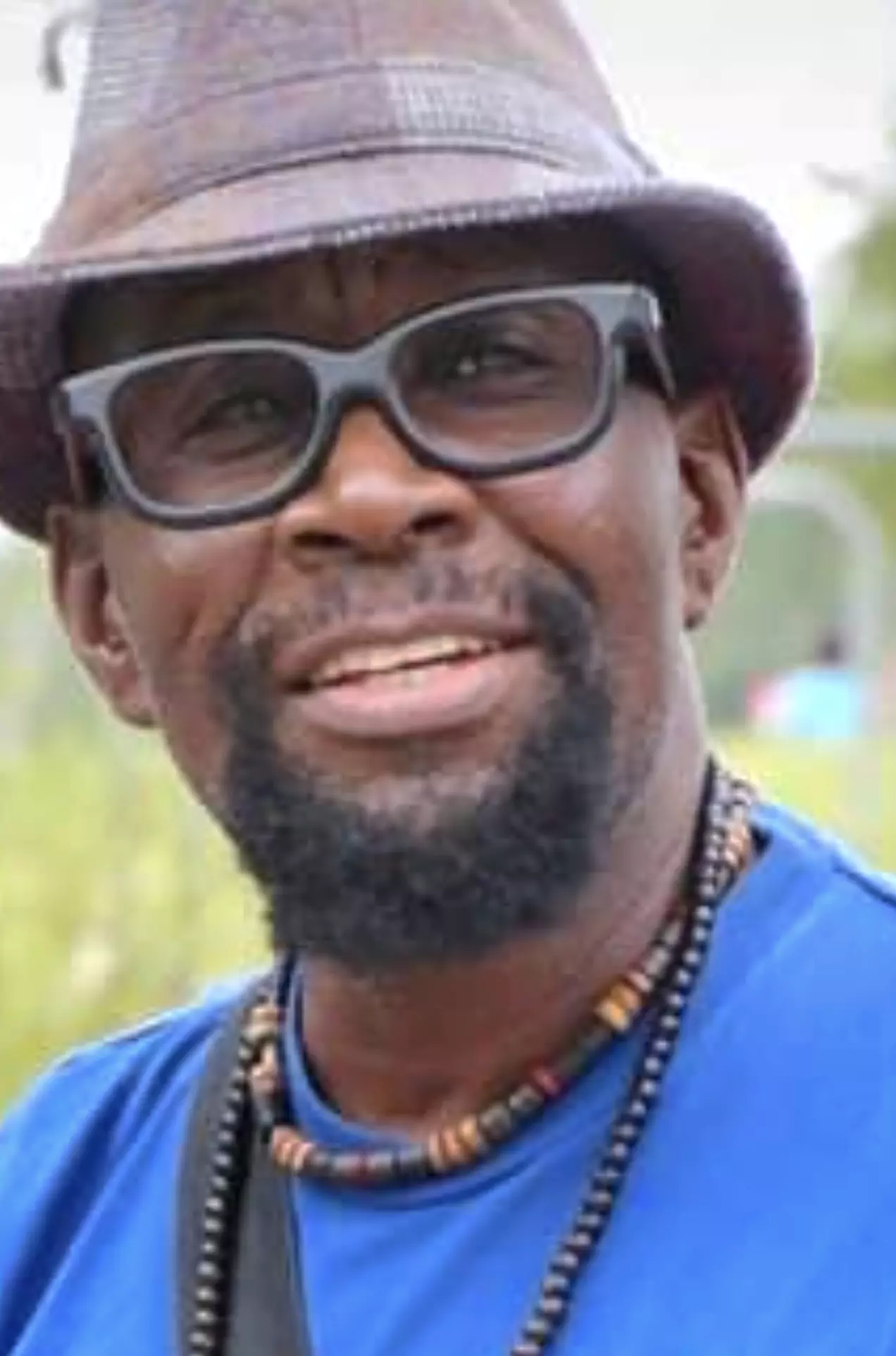 |
Lucky Moyo Sittingbourne - Kent - United Kingdom Lucky Moyo is a Zimbabwean singer songwriter based in the U.K. www.luckymoyo.me |
Session 1 (Fri. 9:30 a.m.) All Singing - Ndebele Singing - Learn songs about various Ndebele topical and traditional issues.Session 2 (Fri. 1:00 p.m.) All Drum - General Drumming - Understanding drumming technique and where one gets different sounds on the drum.Session 3 (Fri. 3:30 p.m.) All Presentation - Songwriting About Issues - A look at using songwriting to address particular issues such as protest, environment or gender.Session 6 (Sat. 3:30 p.m.) All Dance - Gumboot Dance - Learn rubber boot dancing from the mines of South Africa. Participants in this workshop are invited to perform in the Festival Highlights show from 4:10 - 5:00 p.m. on Sunday, Aug. 10 if available.Session 7 (Sun. 1:00 p.m.) All Drum - TjiKalanga Drumming - Learn to play the TjiKalanga drum rhythms of the amabhiza dance. |
Session 1 (Fri. 9:30 a.m.) All Singing - Ndebele Singing - Learn songs about various Ndebele topical and traditional issues. |
Session 2 (Fri. 1:00 p.m.) All Drum - General Drumming - Understanding drumming technique and where one gets different sounds on the drum. |
Session 3 (Fri. 3:30 p.m.) All Presentation - Songwriting About Issues - A look at using songwriting to address particular issues such as protest, environment or gender. |
Session 6 (Sat. 3:30 p.m.) All Dance - Gumboot Dance - Learn rubber boot dancing from the mines of South Africa. Participants in this workshop are invited to perform in the Festival Highlights show from 4:10 - 5:00 p.m. on Sunday, Aug. 10 if available. |
Session 7 (Sun. 1:00 p.m.) All Drum - TjiKalanga Drumming - Learn to play the TjiKalanga drum rhythms of the amabhiza dance. |
|||||||
| 35 | Maria Minnaar Bailey | 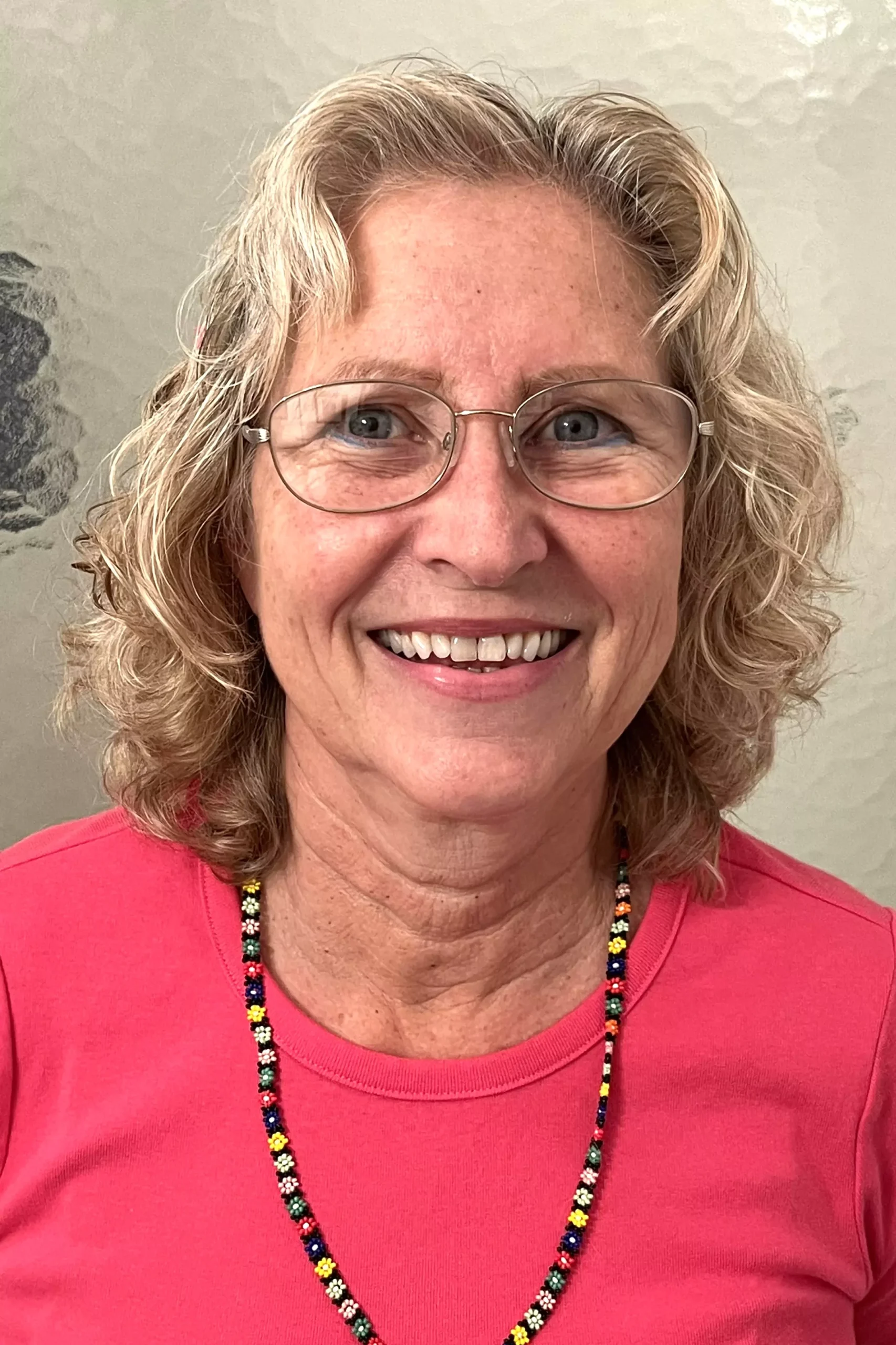 |
Maria Minnaar Bailey Joplin - MO - United States Maria Minnaar Bailey grew up in Zimbabwe. She attended Northlea High School in Bulawayo from 1974 to 1979, where she joined the newly formed Northlea Marimba Band. Her father, ethnomusicologist Olof Axelsson, was the principal of Kwanongoma College of African Music at that time, with Alport Mhlanga serving as director of the Kwanongoma Marimba Band. Maria's teachers were students from Kwanongoma, including the late Sheasby Matiure, Soft Sibanda, and Mickey Nemarundwe. Since immigrating to the USA in 1984, Maria has directed several youth and community marimba bands, and is currently a member and director of the Kufara marimba band in Joplin, Missouri. The band plays on timbila-style marimbas, designed and built in Zimbabwe by Maria's late father. Maria has written three books (with audio CDs) for music teachers: the Chaia Marimba Music Book series, which include choral as well as marimba arrangements. |
Session 2 (Fri. 1:00 p.m.) All Singing - Tinotenda Hosana - This is a church song from Zimbabwe which I learned growing up. It is a song of thanks and praise. For those who really want to sing in Shona or Ndebele, but feel challenged by too many words: here is your workshop! There are only 4 words to learn. We will sing in 4-part harmony and learn a very simple dancestep as well.Session 3 (Fri. 3:30 p.m.) Novice Marimba - Singonki - This is one of the earliest tunes arranged by Sekuru Alport Mhlanga for the Kwanongoma College Marimba Band in Bulawayo, Zimbabwe, and it comes from the Lozi people of Zambia. "Singonki" is the name of a small fish, similar to a barbel or catfish. It is a fun song to play, with its interlocking rhythms. The chord patterns are fairly easy, but the chords are not typical Western music chords, giving students an insight into how varied and interesting the music of different cultures can be.Session 4 (Sat. 9:30 a.m.) Intermediate Marimba - Zambezi - This upbeat song is named after the Zambezi River, which forms the northern border of Zimbabwe. Originally written as an accordion piece by Nico Carstens of South Africa, it was adapted for marimbas by the Kwanongoma Marimba Band in Bulawayo, Zimbabwe, in the 1970s. It is a catchy tune with some fast sticking on the lead parts and is a lot of fun to play! But be warned, this is not a song for slackers; it has three different sections, and every instrument changes its part for each section. You will be working hard!Session 5 (Sat. 1:00 p.m.) Intermediate Marimba - Otsotsi - Meaning "villain" or "scoundrel," "Otsotsi" is an upbeat, fun-to-play marimba piece about a car thief. (Note: This is NOT the same song as Botsotsi, by Michael Sibanda.) I learned this song in the 1970s in Zimbabwe from Kwanongoma students Sheasby Matiure and Mickey Nemarundwe. I have added to the marimba arrangement since then. You will definitely enjoy this tune! |
Session 2 (Fri. 1:00 p.m.) All Singing - Tinotenda Hosana - This is a church song from Zimbabwe which I learned growing up. It is a song of thanks and praise. For those who really want to sing in Shona or Ndebele, but feel challenged by too many words: here is your workshop! There are only 4 words to learn. We will sing in 4-part harmony and learn a very simple dancestep as well. |
Session 3 (Fri. 3:30 p.m.) Novice Marimba - Singonki - This is one of the earliest tunes arranged by Sekuru Alport Mhlanga for the Kwanongoma College Marimba Band in Bulawayo, Zimbabwe, and it comes from the Lozi people of Zambia. "Singonki" is the name of a small fish, similar to a barbel or catfish. It is a fun song to play, with its interlocking rhythms. The chord patterns are fairly easy, but the chords are not typical Western music chords, giving students an insight into how varied and interesting the music of different cultures can be. |
Session 4 (Sat. 9:30 a.m.) Intermediate Marimba - Zambezi - This upbeat song is named after the Zambezi River, which forms the northern border of Zimbabwe. Originally written as an accordion piece by Nico Carstens of South Africa, it was adapted for marimbas by the Kwanongoma Marimba Band in Bulawayo, Zimbabwe, in the 1970s. It is a catchy tune with some fast sticking on the lead parts and is a lot of fun to play! But be warned, this is not a song for slackers; it has three different sections, and every instrument changes its part for each section. You will be working hard! |
Session 5 (Sat. 1:00 p.m.) Intermediate Marimba - Otsotsi - Meaning "villain" or "scoundrel," "Otsotsi" is an upbeat, fun-to-play marimba piece about a car thief. (Note: This is NOT the same song as Botsotsi, by Michael Sibanda.) I learned this song in the 1970s in Zimbabwe from Kwanongoma students Sheasby Matiure and Mickey Nemarundwe. I have added to the marimba arrangement since then. You will definitely enjoy this tune! |
||||||||
| 10 | Michael Sibanda | 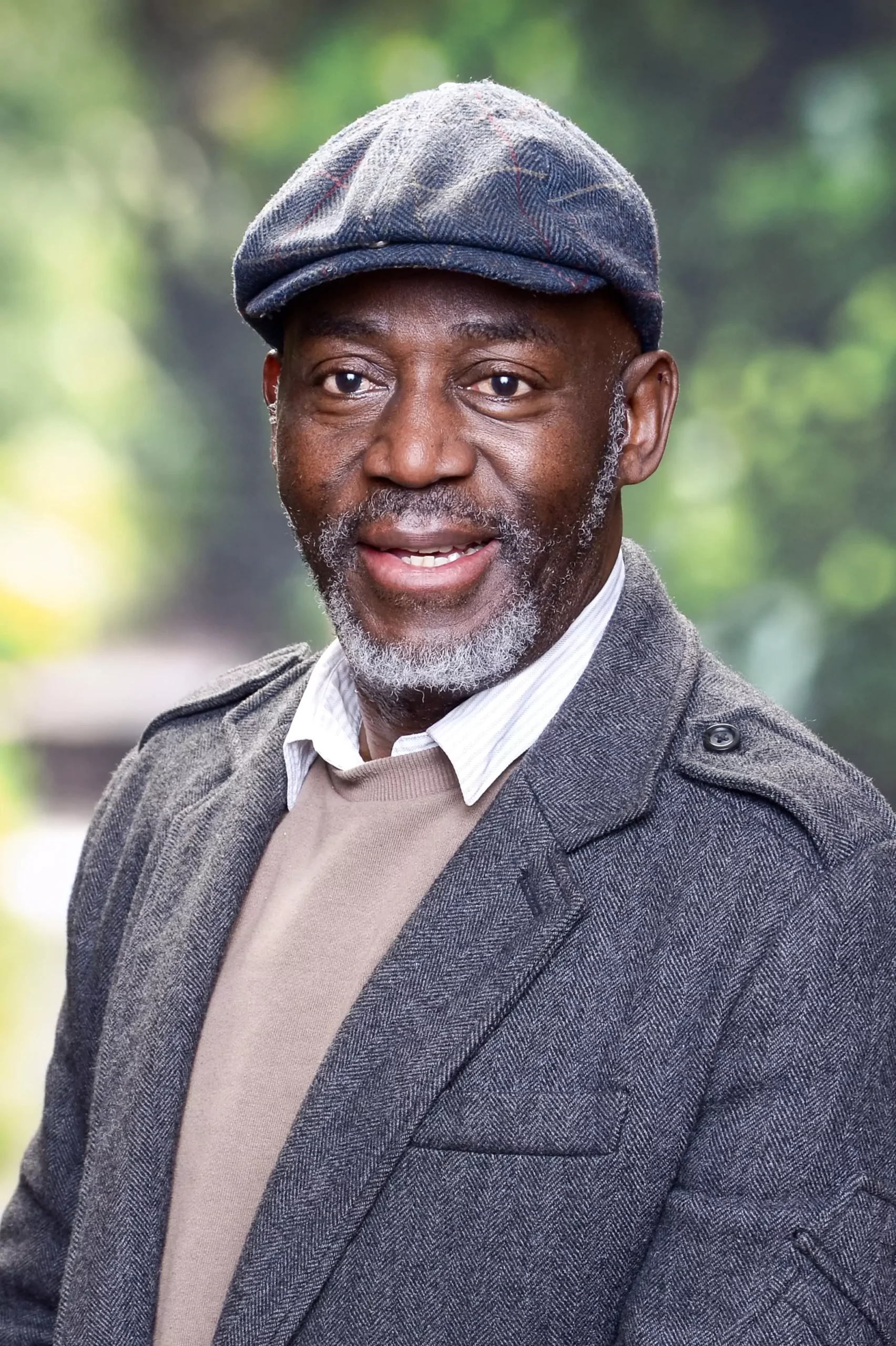 |
Michael Sibanda Johannesburg - Gauteng - South Africa Michael Sibanda is a highly regarded marimba music composer, arranger, performer, and educator with over 30 years of international experience. Currently the African Music Director at St Stithians College in Johannesburg, he holds a Music Teaching Diploma from Kwanongoma College of Music and a Bachelor of Music Honours from the University of Pretoria. Michael has directed ensembles that have performed worldwide, collaborated with renowned artists, and frequently adjudicated and presented at prominent festivals and conferences. He is frequently invited to present marimba workshops and collaborative team building sessions. Michael’s passion for sharing Africa’s musical heritage drives his educational work, including a YouTube channel with the Marimba Education Foundation to introduce marimba music to new audiences. |
Session 1 (Fri. 9:30 a.m.) Novice Marimba - Vana Vechikoro - “Vana Vechikoro” is a traditional Shona song that translates to “Schoolchildren” in English. Also done by Thomas Mapfumo, it is often sung in schools and community gatherings, carrying messages about education, discipline and the experiences of students. Like many Shona traditional songs, it follows a call-and-response format with cyclical rhythms, making it a great choice for marimba ensembles.Session 2 (Fri. 1:00 p.m.) Intermediate Marimba - Zirume - "Zirume" is a traditional Shona song, often performed with mbira, marimba and percussion. The word “Zirume” can carry different meanings depending on the context, but in many traditional songs it reflects themes of wisdom, ancestral respect and communal values.To capture the mbira-inspired interlocking rhythms, my four-part marimba arrangement is for the soprano which plays the main melody, imitating the kutsinhira (lead mbira part), with the tenor adding variations and fills, responding to the soprano’s melody, the baritone providing harmonic support with broken chords and syncopation and the bass driving the groove with deep, pulsing basslines.Session 3 (Fri. 3:30 p.m.) Intermediate Marimba - Nwa Baby - “Nwa Baby” by Flavour is a hit Nigerian Afrobeat song, originally “Sawale” by Rex Lawson. The track blends catchy rhythms with infectious melodies, creating an upbeat vibe with an undeniable dance energy. Its rhythmic complexity and infectious hooks make it an excellent choice for a marimba arrangement. The original version features a rich combination of Afrobeat rhythms, energetic horns and sultry vocals, which I have adapted for the marimba.Session 5 (Sat. 1:00 p.m.) Novice Marimba - Siyamboka - “Siyamboka” stands as a testament to the rich musical traditions of the Lozi people who reside along the Zambezi Valley. This marimba piece, cherished as a standard at Kwanongoma College of Music, embodies the essence of African marimba music with its intricate rhythms, harmonic interplay and vibrant energy. This piece not only serves as a cultural bridge, bringing the sounds of the Zambezi Valley to global audiences, but it also provides a rich learning opportunity for marimba students to develop skills in rhythm, harmony and ensemble playing.Session 6 (Sat. 3:30 p.m.) Intermediate Marimba - Rugare 1 - Alport Mhlanga's composition “Rugare 1,” which means peace, exemplifies the rich cultural heritage and vibrant rhythms characteristic of Southern African marimba music. Mhlanga’s contributions to marimba music have been significant. He was a pivotal figure in the development of Zimbabwean marimba and marimba music, mentoring numerous students and leading ensembles at Kwanongoma College of Music. Participants in this workshop are invited to perform in the Festival Highlights show from 4:10 - 5:00 p.m. on Sunday, Aug. 10 if available.Session 7 (Sun. 1:00 p.m.) Advanced Marimba - Ngorimba - “Ngorimba” is a notable track (and name of an album) by the late Comrade Chinx (Dickson Chingaira), a prominent Zimbabwean musician renowned for his revolutionary songs during the country’s liberation struggle. The term “Ngorimba” is a fusion of “ngoma” (drum) and “marimba,” reflecting the song’s deep roots in Zimbabwean musical traditions. The song showcases a rich blend of traditional rhythms and instruments, and the marimba arrangement has a driving bassline inspired by the original groove, polyrhythmic tenor and baritone harmonies and a fast, intricate soprano melody (mimicking vocals and guitar). I have added djembe and hosho rhythms for added authenticity. |
Session 1 (Fri. 9:30 a.m.) Novice Marimba - Vana Vechikoro - “Vana Vechikoro” is a traditional Shona song that translates to “Schoolchildren” in English. Also done by Thomas Mapfumo, it is often sung in schools and community gatherings, carrying messages about education, discipline and the experiences of students. Like many Shona traditional songs, it follows a call-and-response format with cyclical rhythms, making it a great choice for marimba ensembles. |
Session 2 (Fri. 1:00 p.m.) Intermediate Marimba - Zirume - "Zirume" is a traditional Shona song, often performed with mbira, marimba and percussion. The word “Zirume” can carry different meanings depending on the context, but in many traditional songs it reflects themes of wisdom, ancestral respect and communal values.To capture the mbira-inspired interlocking rhythms, my four-part marimba arrangement is for the soprano which plays the main melody, imitating the kutsinhira (lead mbira part), with the tenor adding variations and fills, responding to the soprano’s melody, the baritone providing harmonic support with broken chords and syncopation and the bass driving the groove with deep, pulsing basslines. |
Session 3 (Fri. 3:30 p.m.) Intermediate Marimba - Nwa Baby - “Nwa Baby” by Flavour is a hit Nigerian Afrobeat song, originally “Sawale” by Rex Lawson. The track blends catchy rhythms with infectious melodies, creating an upbeat vibe with an undeniable dance energy. Its rhythmic complexity and infectious hooks make it an excellent choice for a marimba arrangement. The original version features a rich combination of Afrobeat rhythms, energetic horns and sultry vocals, which I have adapted for the marimba. |
Session 5 (Sat. 1:00 p.m.) Novice Marimba - Siyamboka - “Siyamboka” stands as a testament to the rich musical traditions of the Lozi people who reside along the Zambezi Valley. This marimba piece, cherished as a standard at Kwanongoma College of Music, embodies the essence of African marimba music with its intricate rhythms, harmonic interplay and vibrant energy. This piece not only serves as a cultural bridge, bringing the sounds of the Zambezi Valley to global audiences, but it also provides a rich learning opportunity for marimba students to develop skills in rhythm, harmony and ensemble playing. |
Session 6 (Sat. 3:30 p.m.) Intermediate Marimba - Rugare 1 - Alport Mhlanga's composition “Rugare 1,” which means peace, exemplifies the rich cultural heritage and vibrant rhythms characteristic of Southern African marimba music. Mhlanga’s contributions to marimba music have been significant. He was a pivotal figure in the development of Zimbabwean marimba and marimba music, mentoring numerous students and leading ensembles at Kwanongoma College of Music. Participants in this workshop are invited to perform in the Festival Highlights show from 4:10 - 5:00 p.m. on Sunday, Aug. 10 if available. |
Session 7 (Sun. 1:00 p.m.) Advanced Marimba - Ngorimba - “Ngorimba” is a notable track (and name of an album) by the late Comrade Chinx (Dickson Chingaira), a prominent Zimbabwean musician renowned for his revolutionary songs during the country’s liberation struggle. The term “Ngorimba” is a fusion of “ngoma” (drum) and “marimba,” reflecting the song’s deep roots in Zimbabwean musical traditions. The song showcases a rich blend of traditional rhythms and instruments, and the marimba arrangement has a driving bassline inspired by the original groove, polyrhythmic tenor and baritone harmonies and a fast, intricate soprano melody (mimicking vocals and guitar). I have added djembe and hosho rhythms for added authenticity. |
||||||
| 15 | Musekiwa Chingodza | 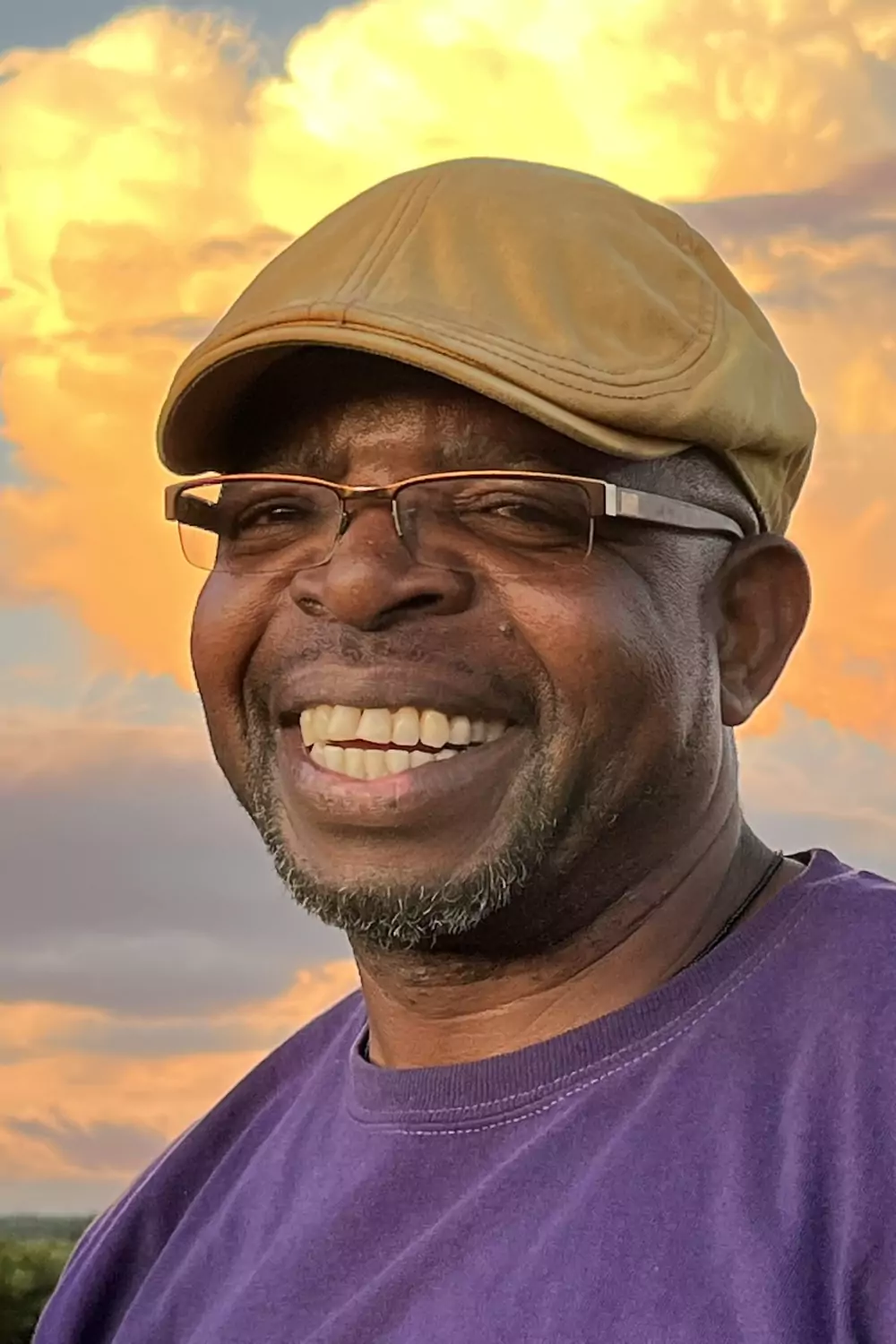 |
Musekiwa Chingodza Eugene - OR - United States Musekiwa Chingodza was born into a family of great mbira players in Mwangara village, Murewa, Zimbabwe, in 1970. He began playing mbira at the age of five and is self-taught. Through listening to other gwenyambira, or great mbira players, he developed a strong attachment to and love for mbira music. He has recorded solo albums and also in collaboration with Chris Berry, Jennifer Kyker, Bud Cohen, Sumi Madzitateguru, and Tute and Irene Chigamba. He continues to be in demand to play mbira at ceremonies in Zimbabwe. Since 1999, he has been a regular visitor to the U.S., sponsored biennially by Kutsinhira Cultural Arts Center in Eugene, Oregon, and has recently extended his musical touring to include Japan and France. In 2024, he was commissioned by Grammy Award winning Third Coast Percussion to compose a mbira song for their 20th anniversary and record it with them. He says, “Our music is both medicine and food, as mbira has the power to heal and to provide for people. Mbira pleases both the living and the dead.” |
Session 2 (Fri. 1:00 p.m.) Intermediate Mbira - Serevende YaNyamaropa - “Serevende” is a thing which goes on and on. This mbira song is very often played at the bira ceremony. Musekiwa will teach kushaura and kutsinhira parts, how to connect them and where to connect with the hosho beat. Time permitting, variations and high lines will be added.Session 3 (Fri. 3:30 p.m.) All Drum - Jiti Song: Chawasarira - “Chawasarira” means "Why did you leave us behind?" This is one of the songs that we sing at kurova guva ceremonies, one year after a family member has passed.Session 4 (Sat. 9:30 a.m.) Beginner Hosho - Hosho Basics - Learn the basics of good mbira hosho techniques, useful for both mbira and marimba. Time permitting, flashy tricks will be taught.Session 5 (Sat. 1:00 p.m.) Intermediate Mbira - Taireva - "Taireva" means "we told you" or “we used to warn you.” This mbira song is very often played at the bira ceremony. Musekiwa will teach kushaura and kutsinhira parts and how to connect them, and where to connect with the hosho beat.
Time permitting, variations and high lines will be added.Session 6 (Sat. 3:30 p.m.) All Singing - Nhemamusasa - "Nhemamusasa" means "building a new home." Musekiwa will teach beautiful singing lines to this well-known mbira song; don't miss out. More experienced singers will enjoy learning lead lines, but all can try, and will be able to sing the responses. Pronunciation and translation will be taught, along with where the singing fits with mbira and hosho. |
Session 2 (Fri. 1:00 p.m.) Intermediate Mbira - Serevende YaNyamaropa - “Serevende” is a thing which goes on and on. This mbira song is very often played at the bira ceremony. Musekiwa will teach kushaura and kutsinhira parts, how to connect them and where to connect with the hosho beat. Time permitting, variations and high lines will be added. |
Session 3 (Fri. 3:30 p.m.) All Drum - Jiti Song: Chawasarira - “Chawasarira” means "Why did you leave us behind?" This is one of the songs that we sing at kurova guva ceremonies, one year after a family member has passed. |
Session 4 (Sat. 9:30 a.m.) Beginner Hosho - Hosho Basics - Learn the basics of good mbira hosho techniques, useful for both mbira and marimba. Time permitting, flashy tricks will be taught. |
Session 5 (Sat. 1:00 p.m.) Intermediate Mbira - Taireva - "Taireva" means "we told you" or “we used to warn you.” This mbira song is very often played at the bira ceremony. Musekiwa will teach kushaura and kutsinhira parts and how to connect them, and where to connect with the hosho beat.
Time permitting, variations and high lines will be added. |
Session 6 (Sat. 3:30 p.m.) All Singing - Nhemamusasa - "Nhemamusasa" means "building a new home." Musekiwa will teach beautiful singing lines to this well-known mbira song; don't miss out. More experienced singers will enjoy learning lead lines, but all can try, and will be able to sing the responses. Pronunciation and translation will be taught, along with where the singing fits with mbira and hosho. |
|||||||
| 14 | MyLinda King | 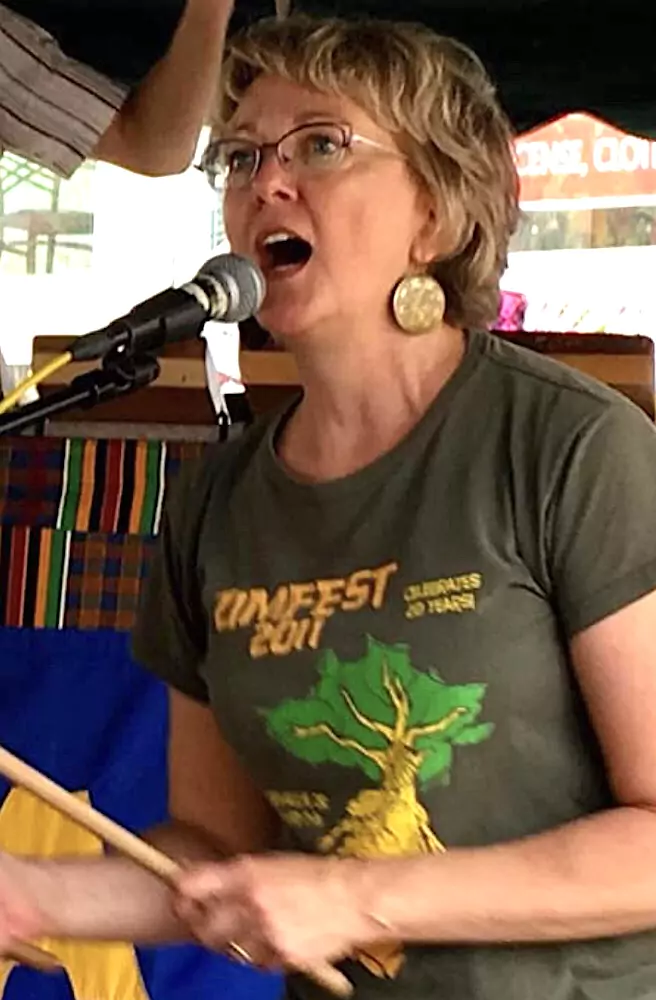 |
MyLinda King Portland - OR - United States MyLinda learned to play marimba and hosho when she joined Boka Marimba in 1989. Before then she was a classically trained pianist with a degree from the Oberlin Conservatory, but Zimbabwean marimba music captivated her interest. She is now a full-time marimba teacher and performer. Besides teaching at Zimfest, MyLinda teaches 6-8 marimba classes a week in her home studio and is a regular teacher at the Northwest Women’s Music Camp. She has started numerous marimba programs in public and private schools around Portland. MyLinda also enjoys giving teacher-training workshops to teachers wishing to bring Zim marimba music into the curriculum. |
Session 1 (Fri. 9:30 a.m.) Intermediate Marimba - Kwalanga Kuya Kwa Kwa - This high-energy song was first recorded by Themba Tana in the 1980s. This arrangement is in the F major pentatonic mode which gives the song an unusual flavor. Other surprises include a brief modulation to G major and a lightning fast soprano duet in the middle. The lead and first soprano parts require some technical prowess but the other parts are not too difficult. A little cowbell spices things up.Session 3 (Fri. 3:30 p.m.) Beginner Hosho - Introduction To Hosho - Even if you have never held a pair of hosho in your hands you can take this workshop. The trick to good hosho playing is the right combination of crispy and swishy. You will learn three basic patterns that will allow you to play with any song. The focus will be on good body mechanics and staying relaxed.Session 5 (Sat. 1:00 p.m.) Novice Marimba - Buya Africa - This is MyLinda’s arrangement of the well-known anthem “Buya Africa” (Come back to Africa). The lead could contain some tricky parts so an intermediate player could benefit from this workshop.Session 7 (Sun. 1:00 p.m.) Beginner Marimba - Ncuzu - This simple two-phrase song was composed by Dumi Maraire and was inspired by the Ndebele dance “Ingquzu.” The piece starts slowly and like a train leaving the station gathers momentum before bursting into more complex rhythms. The first part of the song can stand alone and serve as an introductory song, especially for kids.Session 8 (Sun. 3:30 p.m.) Intermediate Marimba - Chemutengure on Marimba - MyLinda’s arrangement is an amalgamation of several versions and inspirations learned over the last 25 years. Primary influences are Ephat Mujuru, Alport Mhlanga and Stella Chiweshe. Chemutengure is a well-known song about a wagon driver, and this version starts slowly and laboriously as the oxen free the wagon from the mud and it gains speed. The parts can be adapted from the most beginning student to the intermediate student. MyLinda is very experienced mixing different levels of students. Simple vocals will be taught if there is time. |
Session 1 (Fri. 9:30 a.m.) Intermediate Marimba - Kwalanga Kuya Kwa Kwa - This high-energy song was first recorded by Themba Tana in the 1980s. This arrangement is in the F major pentatonic mode which gives the song an unusual flavor. Other surprises include a brief modulation to G major and a lightning fast soprano duet in the middle. The lead and first soprano parts require some technical prowess but the other parts are not too difficult. A little cowbell spices things up. |
Session 3 (Fri. 3:30 p.m.) Beginner Hosho - Introduction To Hosho - Even if you have never held a pair of hosho in your hands you can take this workshop. The trick to good hosho playing is the right combination of crispy and swishy. You will learn three basic patterns that will allow you to play with any song. The focus will be on good body mechanics and staying relaxed. |
Session 5 (Sat. 1:00 p.m.) Novice Marimba - Buya Africa - This is MyLinda’s arrangement of the well-known anthem “Buya Africa” (Come back to Africa). The lead could contain some tricky parts so an intermediate player could benefit from this workshop. |
Session 7 (Sun. 1:00 p.m.) Beginner Marimba - Ncuzu - This simple two-phrase song was composed by Dumi Maraire and was inspired by the Ndebele dance “Ingquzu.” The piece starts slowly and like a train leaving the station gathers momentum before bursting into more complex rhythms. The first part of the song can stand alone and serve as an introductory song, especially for kids. |
Session 8 (Sun. 3:30 p.m.) Intermediate Marimba - Chemutengure on Marimba - MyLinda’s arrangement is an amalgamation of several versions and inspirations learned over the last 25 years. Primary influences are Ephat Mujuru, Alport Mhlanga and Stella Chiweshe. Chemutengure is a well-known song about a wagon driver, and this version starts slowly and laboriously as the oxen free the wagon from the mud and it gains speed. The parts can be adapted from the most beginning student to the intermediate student. MyLinda is very experienced mixing different levels of students. Simple vocals will be taught if there is time. |
|||||||
| 21 | Ndomupeishe Chipendo | 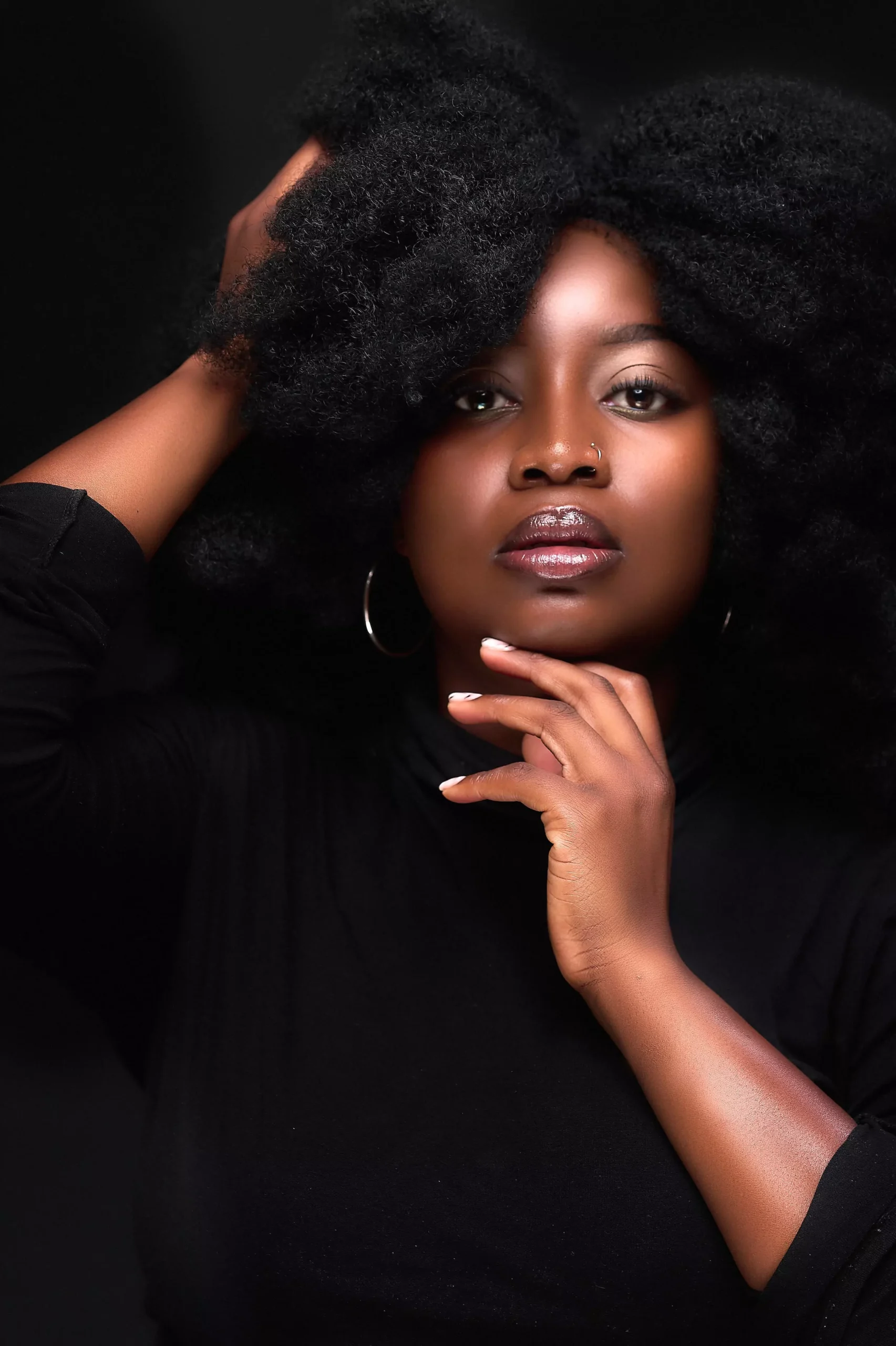 |
Ndomupeishe Chipendo Harare - Harare - Zimbabwe An Award Winning dancer and Multi Disciplinary Creative from Harare Zimbabwe. Earned a Diploma in Performing arts under the dance institute Afrikera Arts Trust, a Professional Certificate in Music under Music Crossroads Academy, Radio Presenting certificate under the Radio Presenter Master Class and a Music business Management and Event production certificate under Music in Africa (Gender@ Work). She is Hard working, versatile, enthusiastic with great social and leadership skills. She is passionate about networking and collaborating with like minded individuals, learning new skills and languages and lastly, influencing and inspiring people with her flamboyant character. Ndomupeishe has acquired vast working experience as a performer nationally, regionally and on international platforms. She is eager to keep learning and adding new skills and knowledge as she adapts to different work environments. |
Session 1 (Fri. 9:30 a.m.) All Drum - Dinhe Drumming - Dinhe is a traditional celebratory dance from Zimbabwe that narrates the historical practices of plowing and harvesting crops, commemorating a bountiful harvest from the past. This dance vividly depicts the stages of planting, the pollination process and the subsequent harvest period. In this workshop, we will explore variations of the drumming patterns to accompany dinhe dance.Session 3 (Fri. 3:30 p.m.) All Dance - Dinhe Dance - Dinhe is a traditional celebratory dance from Zimbabwe that narrates the historical practices of plowing and harvesting crops, commemorating a bountiful harvest from the past. This dance vividly depicts the stages of planting, the pollination process and the subsequent harvest period. In this workshop, we will explore three significant variations of Dinhe, presented in a choreographed format.Session 5 (Sat. 1:00 p.m.) Beginner Hosho - Shona Rhythms - This workshop is dedicated to exploring the various types of Shona rhythms using hosho and wooden clappers. The primary goal is to evoke and cultivate an appreciation for the diverse polyrhythmic patterns present in our traditional music.Session 7 (Sun. 1:00 p.m.) All Dance - Mbakumba Dance - Mbakumba is a polyrhythmic dance originating from the Gutu Masvingo region, traditionally performed to celebrate significant events such as the birth of a newborn, a bountiful harvest or a wedding. This lively dance involves both male and female participants. In this workshop, we will focus on five essential mbakumba steps, along with the accompanying clapping and singing patterns. |
Session 1 (Fri. 9:30 a.m.) All Drum - Dinhe Drumming - Dinhe is a traditional celebratory dance from Zimbabwe that narrates the historical practices of plowing and harvesting crops, commemorating a bountiful harvest from the past. This dance vividly depicts the stages of planting, the pollination process and the subsequent harvest period. In this workshop, we will explore variations of the drumming patterns to accompany dinhe dance. |
Session 3 (Fri. 3:30 p.m.) All Dance - Dinhe Dance - Dinhe is a traditional celebratory dance from Zimbabwe that narrates the historical practices of plowing and harvesting crops, commemorating a bountiful harvest from the past. This dance vividly depicts the stages of planting, the pollination process and the subsequent harvest period. In this workshop, we will explore three significant variations of Dinhe, presented in a choreographed format. |
Session 5 (Sat. 1:00 p.m.) Beginner Hosho - Shona Rhythms - This workshop is dedicated to exploring the various types of Shona rhythms using hosho and wooden clappers. The primary goal is to evoke and cultivate an appreciation for the diverse polyrhythmic patterns present in our traditional music. |
Session 7 (Sun. 1:00 p.m.) All Dance - Mbakumba Dance - Mbakumba is a polyrhythmic dance originating from the Gutu Masvingo region, traditionally performed to celebrate significant events such as the birth of a newborn, a bountiful harvest or a wedding. This lively dance involves both male and female participants. In this workshop, we will focus on five essential mbakumba steps, along with the accompanying clapping and singing patterns. |
||||||||
| 6 | Parker Ediger | 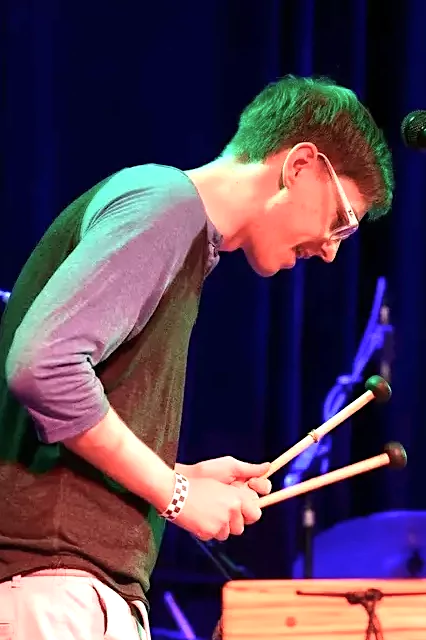 |
Parker Ediger Portland - OR - United States Parker's (they/them) explorations in Zimbabwean music started with playing marimba after school with Rosalie Brown-Lundh at age 11, later picking up mbira with Erica Azim at 13. They attended their first ZimFest in 2010 and have been deeply involved in the community ever since. Parker has played with many performing groups over the years, namely Boka Marimba from Portland. They have continued their education in Zimbabwean music learning from teachers including Musekiwa Chingodza, Patience Munjeri, Caution Shonhai, Fradreck and Sam Mujuru, Cosmas Magaya, Othnell MaNgoma Moyo, and others. They focus specifically on mbira music, both on the instrument itself and mbira-style marimba arrangements. Elsewhere in life, Parker has taught middle school level drumline for several years in Tigard, OR. They are also enrolled at PCC and PSU pursuing a degree in Accounting, hoping to earn their CPA license. |
Session 2 (Fri. 1:00 p.m.) Novice Marimba - Sarura Wako - "Sarura Wako" (Find your Partner) is a Shona children's song arranged for marimba band. Kids would form a circle and take turns singing about their ideal best friend/partner. This song is a great fit for marimba students who love to play upbeat tunes that make people dance! This arrangement is perfect for newer
players and school groups. Students will learn the basic parts, arrangement, call and response singing, and some variations/lead ideas to build upon. Masks will be required for this workshop. |
Session 2 (Fri. 1:00 p.m.) Novice Marimba - Sarura Wako - "Sarura Wako" (Find your Partner) is a Shona children's song arranged for marimba band. Kids would form a circle and take turns singing about their ideal best friend/partner. This song is a great fit for marimba students who love to play upbeat tunes that make people dance! This arrangement is perfect for newer
players and school groups. Students will learn the basic parts, arrangement, call and response singing, and some variations/lead ideas to build upon. Masks will be required for this workshop. |
|||||||||||
| 12 | Ted Wright | 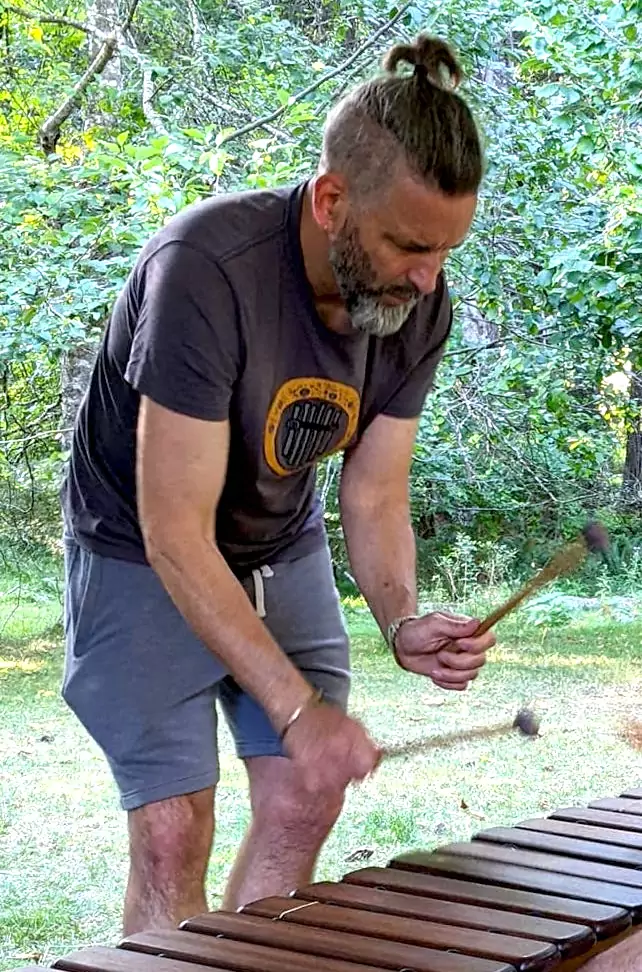 |
Ted Wright Duncan - BC - Canada Ted began his Zimbabwean musical journey in 1993, joining what became Victoria BC's Marimba Muzuva. He has been a teacher of marimba, mbira, chipendani and gumboot dancing for many years, and has traveled to Zimbabwe several times, studying and performing with many of Zimbabwe's top traditional musicians. Ted created and continues to organize the biannual Zimbabwean music and dance gathering Nhemamusasa North, and teaches workshops, school groups and ongoing classes as director of Bopoma on Vancouver Island, British Columbia, Canada. |
Session 4 (Sat. 9:30 a.m.) Novice Mbira - Bukatiende - "Bukatiende" (aka Mukatiende), a standard of the mbira repertoire, means "Wake Up, Let's Go." We’ll work on two kushaura parts, one of which can also be used for kutsinhira, and add some singing if time permits.Session 6 (Sat. 3:30 p.m.) Novice Marimba - Mamuka Sei - This is a song inspired by the ritual of morning greetings in Zimbabwe, with the different marimbas representing different family members. It features call and response tenor parts and has a break featuring a bass/baritone call and response conversation. |
Session 4 (Sat. 9:30 a.m.) Novice Mbira - Bukatiende - "Bukatiende" (aka Mukatiende), a standard of the mbira repertoire, means "Wake Up, Let's Go." We’ll work on two kushaura parts, one of which can also be used for kutsinhira, and add some singing if time permits. |
Session 6 (Sat. 3:30 p.m.) Novice Marimba - Mamuka Sei - This is a song inspired by the ritual of morning greetings in Zimbabwe, with the different marimbas representing different family members. It features call and response tenor parts and has a break featuring a bass/baritone call and response conversation. |
||||||||||
| 18 | Tipei Marazanye | 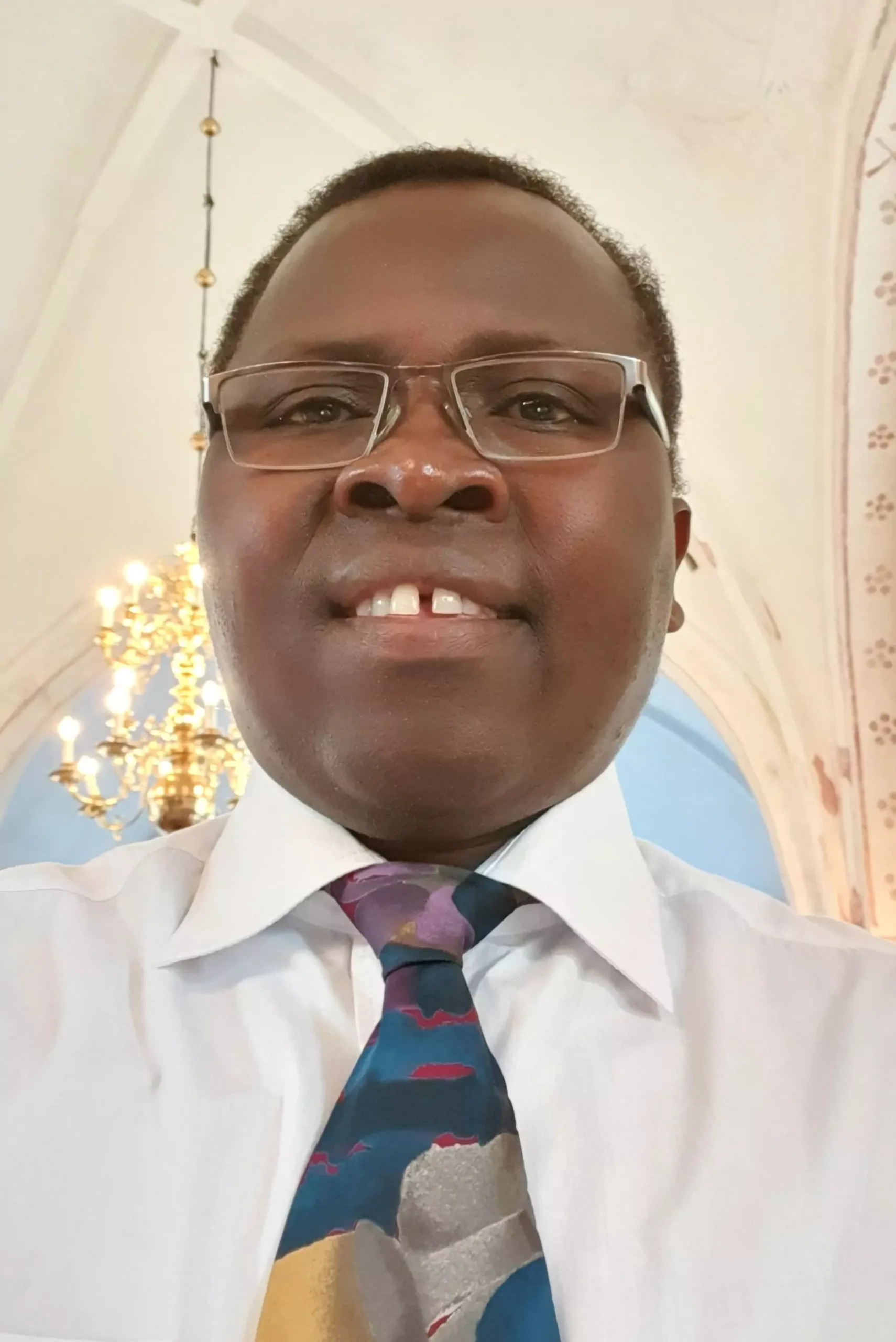 |
Tipei Marazanye Löddeköpinge - Välj - Sweden My name is Tipei Marazanye, a Zimbabwean musician based in the city of Lund, Sweden. I am a parish musician in the Church Of Sweden (Svenska kyrkan), and part of my work as a parish musician is to teach marimba and mbira to school kids and adults within the immediate community. I am a composer of both sacred and secular music, and my first book that contains mainly choral pieces is called Ngoma. Recently, I wrote a Marimba mass which is mostly liturgical stuff for use in my parish and other congregations. Other than being engaged in church as a full time employee, I work with other music groups, playing mostly music from Zimbabwe on mbira with some western instruments accompaniment. I am a teacher by profession, and I did some music studies at the zimbabwe College of Music in Harare- Zimbabwe. Before coming to Sweden, I worked as a music teacher at a culture school and two other schools in Fredrikstad, Norway. |
Session 2 (Fri. 1:00 p.m.) Intermediate Mbira - Rovai Marimba Imi - The nyunga nyunga gives one a feeling of Zim traditional music in this song “Rovai marimba imi” which was composed around 20 years ago. Although it is a gospel song, it has a traditional feel that made some church members in my congregation protest against it back then. The students will get the joy of gospel music in the nyunga nyunga mbira.Session 3 (Fri. 3:30 p.m.) Intermediate Marimba - Baba Va Bhoyi - This is a beautiful song by Susan Mapfumo that carries a message about responsibility. I put together a very nice arrangement that makes the song one of my favorites on marimba. Students will experience how a song slowly gets into the marimba or vice versa. They will have a taste of marimba music from a ”new hand.”Session 4 (Sat. 9:30 a.m.) Novice Marimba - Tozvireva Kupiko - During the war of liberation in Zimbabwe, musicians sang protest songs and those that conscientized people about why the war was fought. One such song was “Tozvireva Kupiko” by Thomas Mapfumo. Surely, this song will remind us about the war of liberation in Rhodesia.Session 5 (Sat. 1:00 p.m.) All Mbira - 23-Key Nyunga Huru - I call the mbira that I developed “Nyunga huru” (large nyunga) solely because it has 23 keys on which one can play songs in three different major keys. For example, the nyunga huru in standard F tuning will have an F major scale, a B flat major scale plus a C major scale. I would like to think that this would be something “kind of new” that I will share with students at Zimfest. We will work on the song “Musandisiye ndega” which is sung in three parts plus a lead singer.Session 7 (Sun. 1:00 p.m.) All Singing - Makwaya Singing/Movement - We will learn several four-part harmony songs by ear. "Zunguza muviri" means shake your body; some dance movements will be part of the singing. “Kwaya“ (plural form “makwaya”) is a Shona word that has been derived from the English word choir. Makwaya relates to Zimbabwean indigenous choral music which was very Afrocentric in nature. Songs to be taught: 1. Siyahamba siyahamba. 2. Kwangena thinabo 3. Juba lami 4. Gona ramachingura Participants in this workshop are invited to perform in the Festival Highlights show from 4:10 - 5:00 p.m. on Sunday, Aug. 10 if available. |
Session 2 (Fri. 1:00 p.m.) Intermediate Mbira - Rovai Marimba Imi - The nyunga nyunga gives one a feeling of Zim traditional music in this song “Rovai marimba imi” which was composed around 20 years ago. Although it is a gospel song, it has a traditional feel that made some church members in my congregation protest against it back then. The students will get the joy of gospel music in the nyunga nyunga mbira. |
Session 3 (Fri. 3:30 p.m.) Intermediate Marimba - Baba Va Bhoyi - This is a beautiful song by Susan Mapfumo that carries a message about responsibility. I put together a very nice arrangement that makes the song one of my favorites on marimba. Students will experience how a song slowly gets into the marimba or vice versa. They will have a taste of marimba music from a ”new hand.” |
Session 4 (Sat. 9:30 a.m.) Novice Marimba - Tozvireva Kupiko - During the war of liberation in Zimbabwe, musicians sang protest songs and those that conscientized people about why the war was fought. One such song was “Tozvireva Kupiko” by Thomas Mapfumo. Surely, this song will remind us about the war of liberation in Rhodesia. |
Session 5 (Sat. 1:00 p.m.) All Mbira - 23-Key Nyunga Huru - I call the mbira that I developed “Nyunga huru” (large nyunga) solely because it has 23 keys on which one can play songs in three different major keys. For example, the nyunga huru in standard F tuning will have an F major scale, a B flat major scale plus a C major scale. I would like to think that this would be something “kind of new” that I will share with students at Zimfest. We will work on the song “Musandisiye ndega” which is sung in three parts plus a lead singer. |
Session 7 (Sun. 1:00 p.m.) All Singing - Makwaya Singing/Movement - We will learn several four-part harmony songs by ear. "Zunguza muviri" means shake your body; some dance movements will be part of the singing. “Kwaya“ (plural form “makwaya”) is a Shona word that has been derived from the English word choir. Makwaya relates to Zimbabwean indigenous choral music which was very Afrocentric in nature. Songs to be taught: 1. Siyahamba siyahamba. 2. Kwangena thinabo 3. Juba lami 4. Gona ramachingura Participants in this workshop are invited to perform in the Festival Highlights show from 4:10 - 5:00 p.m. on Sunday, Aug. 10 if available. |
|||||||
| 38 | Tsungai Tsikirai | 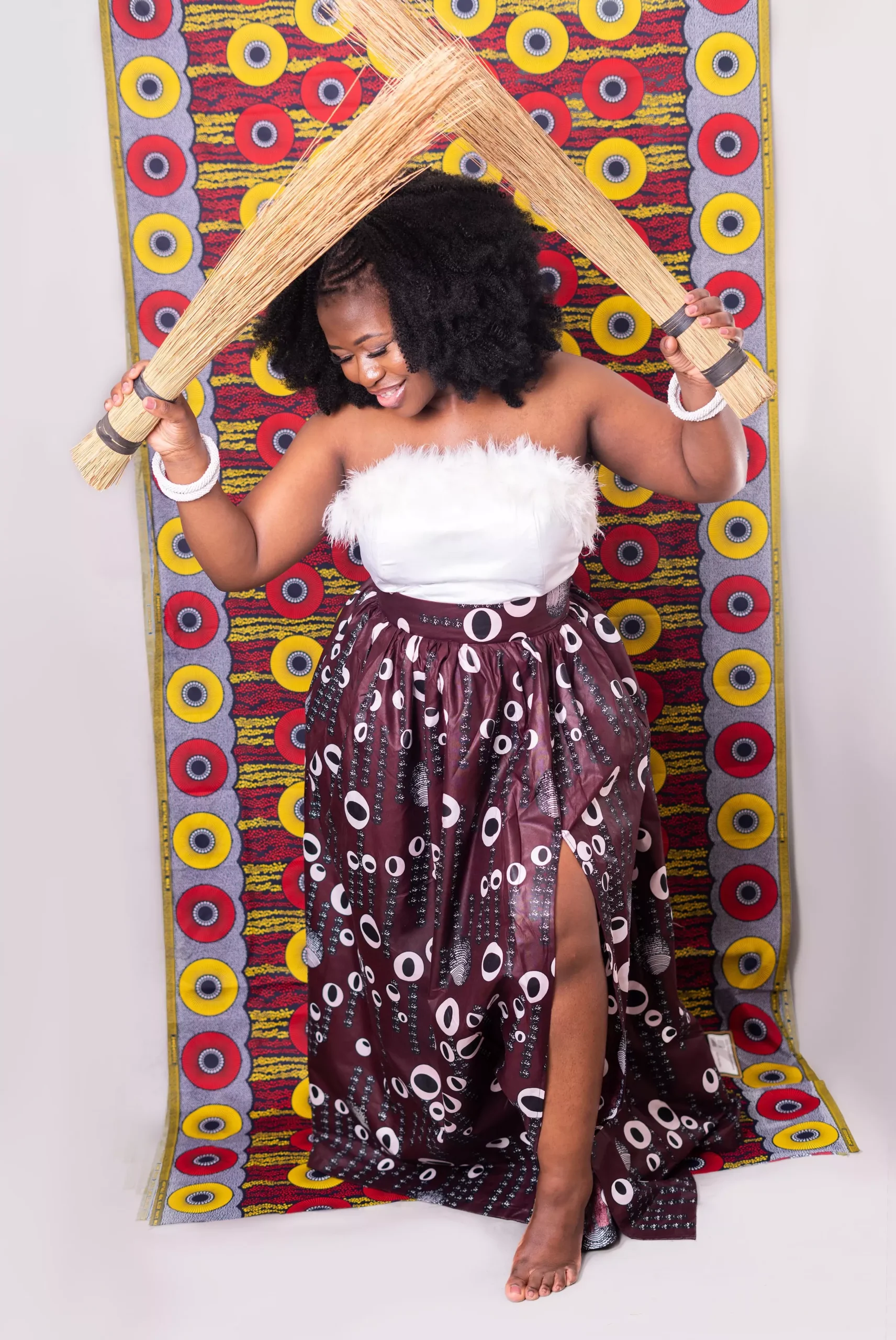 |
Tsungai Tsikirai Windsor - Berkshire - United Kingdom Tsungai Tsikirai is a Zimbabwean-born U.K.- based multi-genre artist. Her deep-rooted appreciation of her Zimbabwean culture, traditional music and heritage has shaped her journey and makes her a joy to watch on stage. Her voice is gentle and confident, allowing her to give audiences an experience while sharing stories about times spent in Zimbabwe, on the road and her hopes for music. Tsungai uses music and dance to celebrate diversity and has collaborated with different platforms to help manage and reduce the effects of mental health issues. From festivals, schools, community and corporate events, Tsungai aims to continue promoting creative therapies. Tsungai has participated in Zimfest since 2018, in Oregon, and continues to look forward to building more and stronger networks to share music. To connect with Tsungai, use the following details and feel free to email as well if not on social media. ''https://www.instagram.com/tsungaitsikirai/ . For more information, visit. www.tsungaitsikirai.com https://www.tsungaitsikirai.com |
Session 2 (Fri. 1:00 p.m.) All Dance - Dance Therapy - Develop movement and body confidence. The gym is not for everyone; dance is also a workout and can be used to communicate, connect and tell a story.Session 5 (Sat. 1:00 p.m.) All Singing - Music Therapy - Learning choral singing in Shona, Ndebele and Zulu languages.Session 6 (Sat. 3:30 p.m.) All Presentation - Shona/Ndebele Language - Introduction to Shona and Ndebele language, focusing on simple communication. This workshop will enable the participants to learn words, sentences and gestures that will make it easy for them to interact with Ndebele or Shona speaking individuals. This is also an opportunity to learn a different language which will become handy should you visit Zimbabwe. |
Session 2 (Fri. 1:00 p.m.) All Dance - Dance Therapy - Develop movement and body confidence. The gym is not for everyone; dance is also a workout and can be used to communicate, connect and tell a story. |
Session 5 (Sat. 1:00 p.m.) All Singing - Music Therapy - Learning choral singing in Shona, Ndebele and Zulu languages. |
Session 6 (Sat. 3:30 p.m.) All Presentation - Shona/Ndebele Language - Introduction to Shona and Ndebele language, focusing on simple communication. This workshop will enable the participants to learn words, sentences and gestures that will make it easy for them to interact with Ndebele or Shona speaking individuals. This is also an opportunity to learn a different language which will become handy should you visit Zimbabwe. |
|||||||||
| 41 | Zivanai Masango | 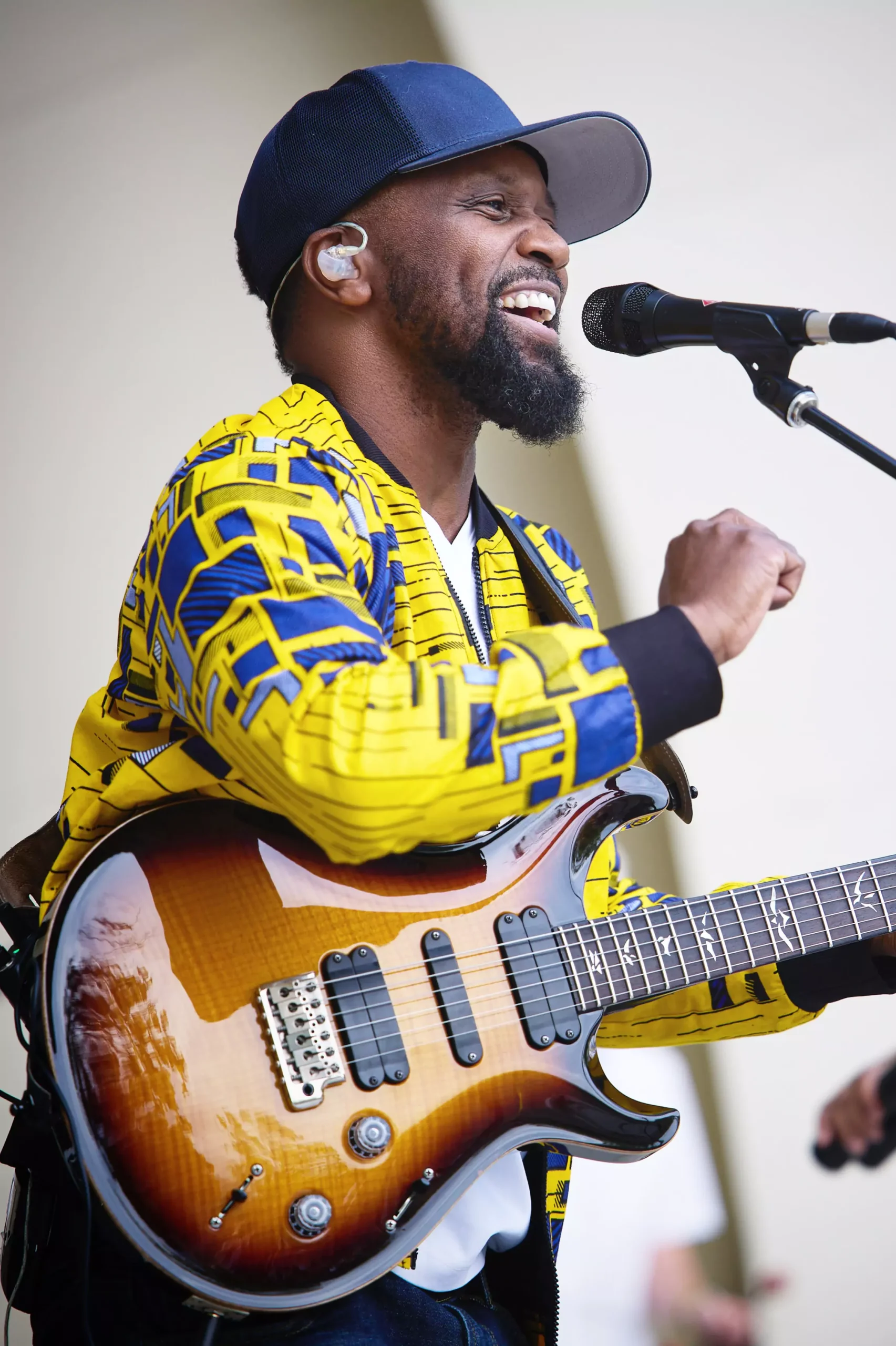 |
Zivanai Masango Westminster - CO - United States Zivanai is an award-winning music artiste, audio engineer and producer as well as a much sought-after music educator. Born in Harare into an extended family of master musicians deeply involved in traditional mbira and brass band music cultures, he was immersed in diverse music traditions and performances from a very early age. That gave him a very solid foundation for a music career that has seen him play with, and share the stage with legendary artistes as diverse as Bonnie Raitt, Black Uhuru, Oliver Mtukudzi, The String Cheese Incident, The Motet, Thomas Mapfumo, Bela Fleck, Elephant Revival and many others. More recently, Zivanai’s Basement Studio Sessions have become a sensation on social media, reinforcing him as one of the leading Zimbabwean musicians of today. |
Session 2 (Fri. 1:00 p.m.) All Other Instrument - Guitar - Learn from the master! This workshop is open to electric and acoustic guitar players at any level. Session 3 (Fri. 3:30 p.m.) Intermediate Other Instrument - Multi-Instrumental Ensemble - This workshop is open to all instrumentalists and vocalists who would like to learn how "popular" music from Zimbabwe and Southern Africa is put together and performed. Participants can bring any instrument, with the requirement that they be fairly proficient at their instrument or have been studying their instrument seriously for at least a year and a half. Participants will learn rhythms and melodies from popular or traditional Zimbabwean songs with the goal of ending up with a fully developed song. This is a very fun process and will be beneficial for musicians of different backgrounds and levels of ability.Session 5 (Sat. 1:00 p.m.) Intermediate Marimba - Marimba By Zivanai - Zivanai will teach a fun, danceable song out of the Zimbabwean popular music canon. |
Session 2 (Fri. 1:00 p.m.) All Other Instrument - Guitar - Learn from the master! This workshop is open to electric and acoustic guitar players at any level. |
Session 3 (Fri. 3:30 p.m.) Intermediate Other Instrument - Multi-Instrumental Ensemble - This workshop is open to all instrumentalists and vocalists who would like to learn how "popular" music from Zimbabwe and Southern Africa is put together and performed. Participants can bring any instrument, with the requirement that they be fairly proficient at their instrument or have been studying their instrument seriously for at least a year and a half. Participants will learn rhythms and melodies from popular or traditional Zimbabwean songs with the goal of ending up with a fully developed song. This is a very fun process and will be beneficial for musicians of different backgrounds and levels of ability. |
Session 5 (Sat. 1:00 p.m.) Intermediate Marimba - Marimba By Zivanai - Zivanai will teach a fun, danceable song out of the Zimbabwean popular music canon. |
